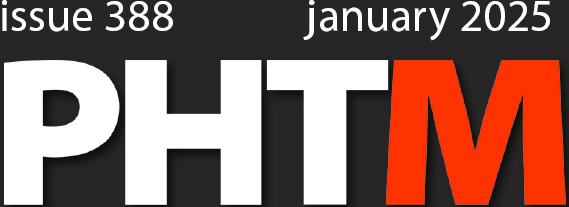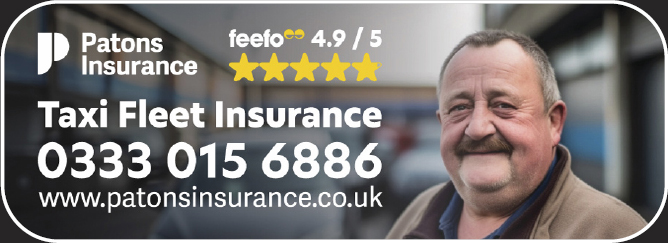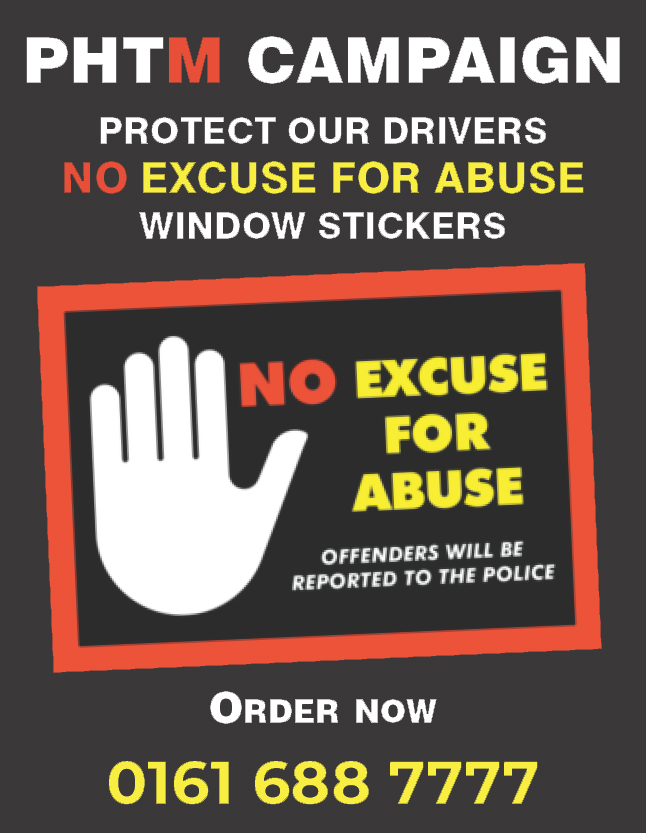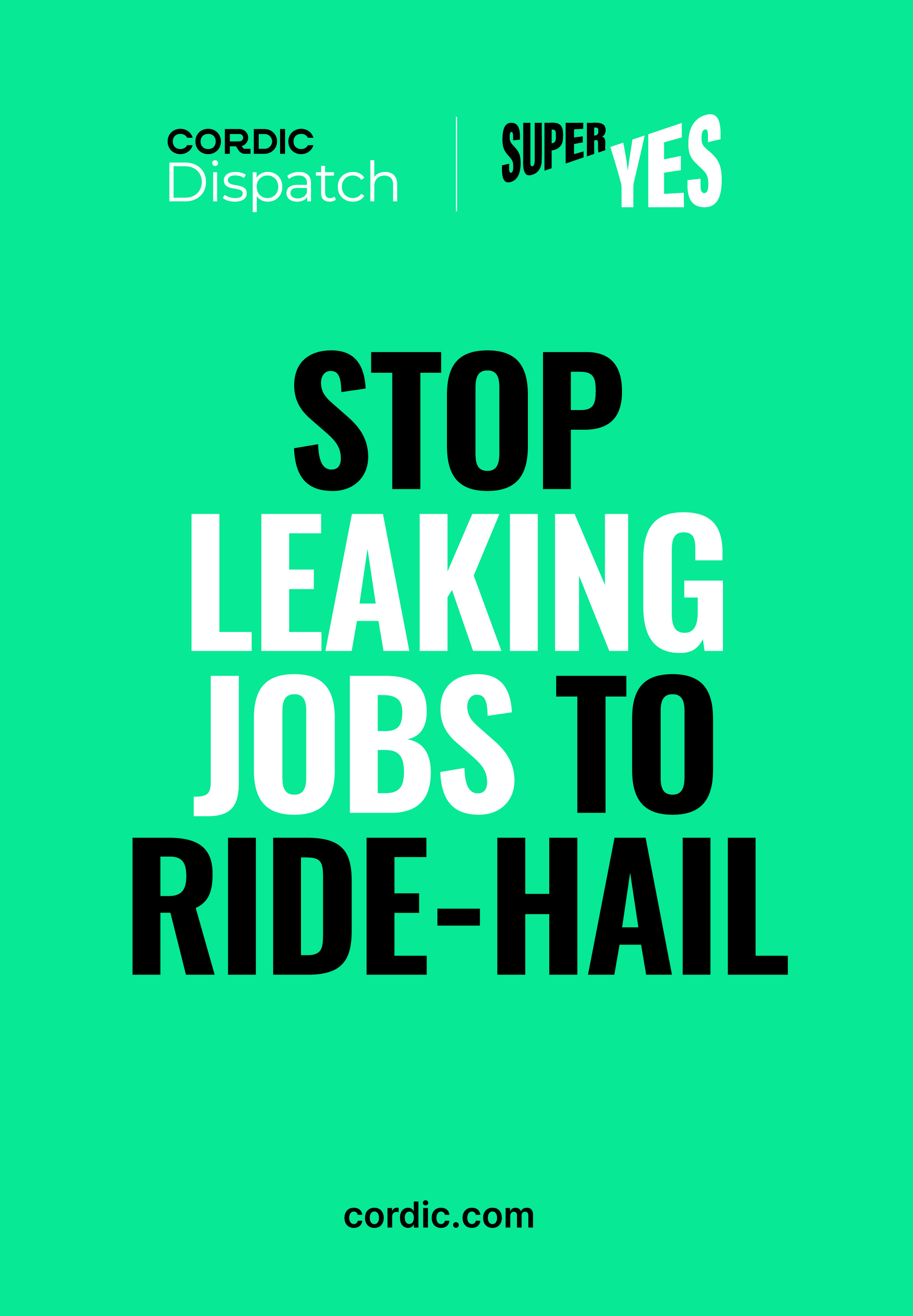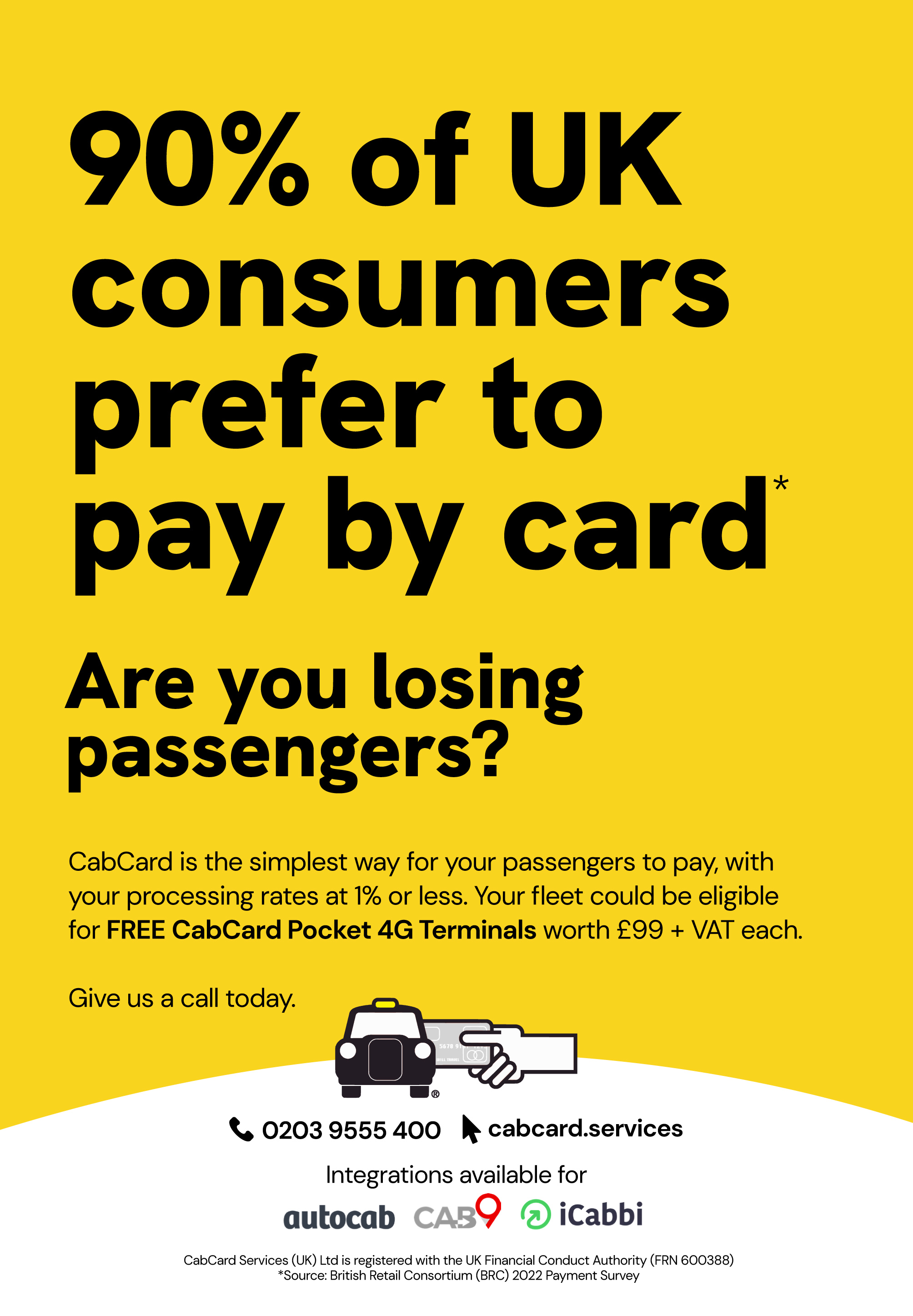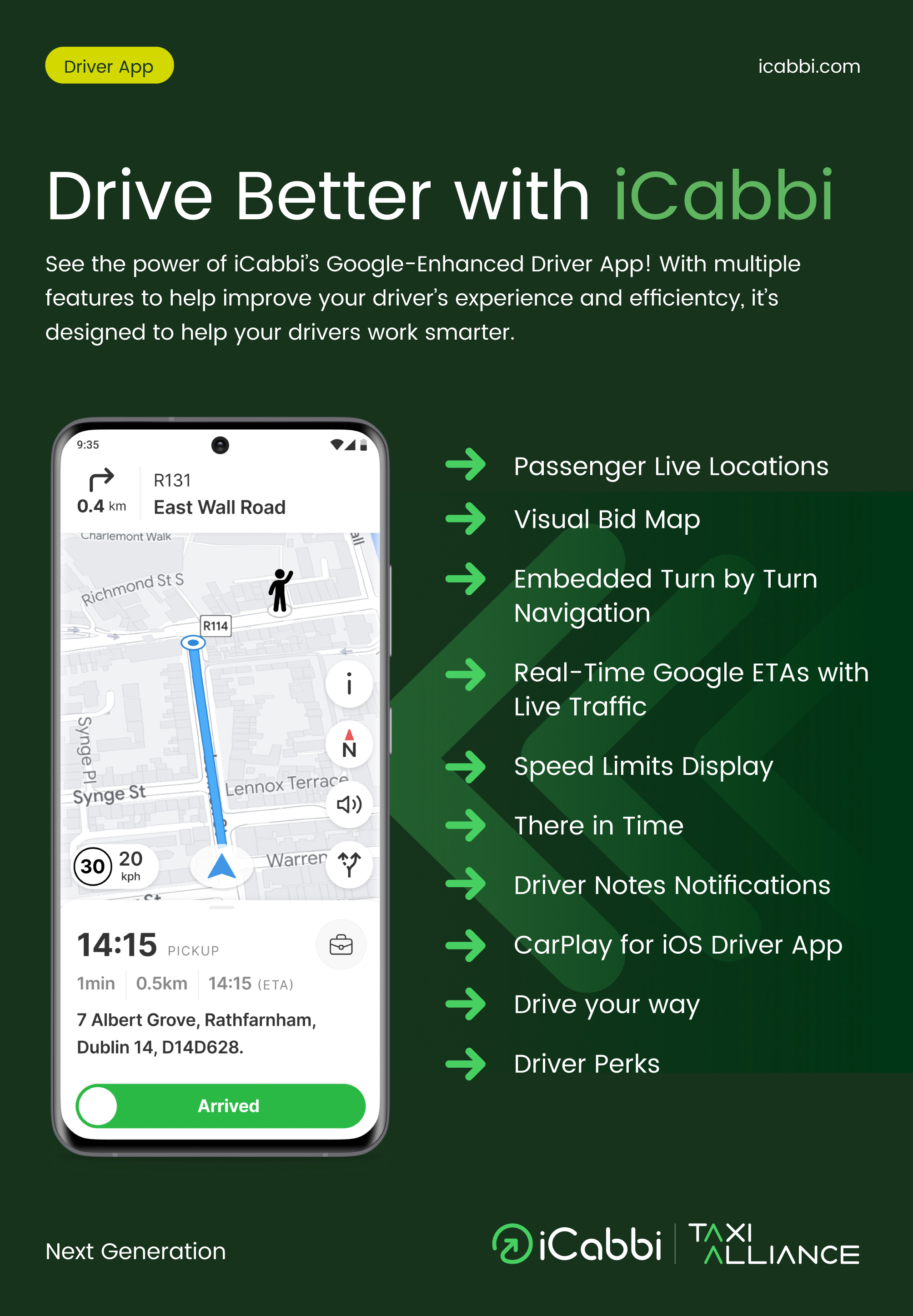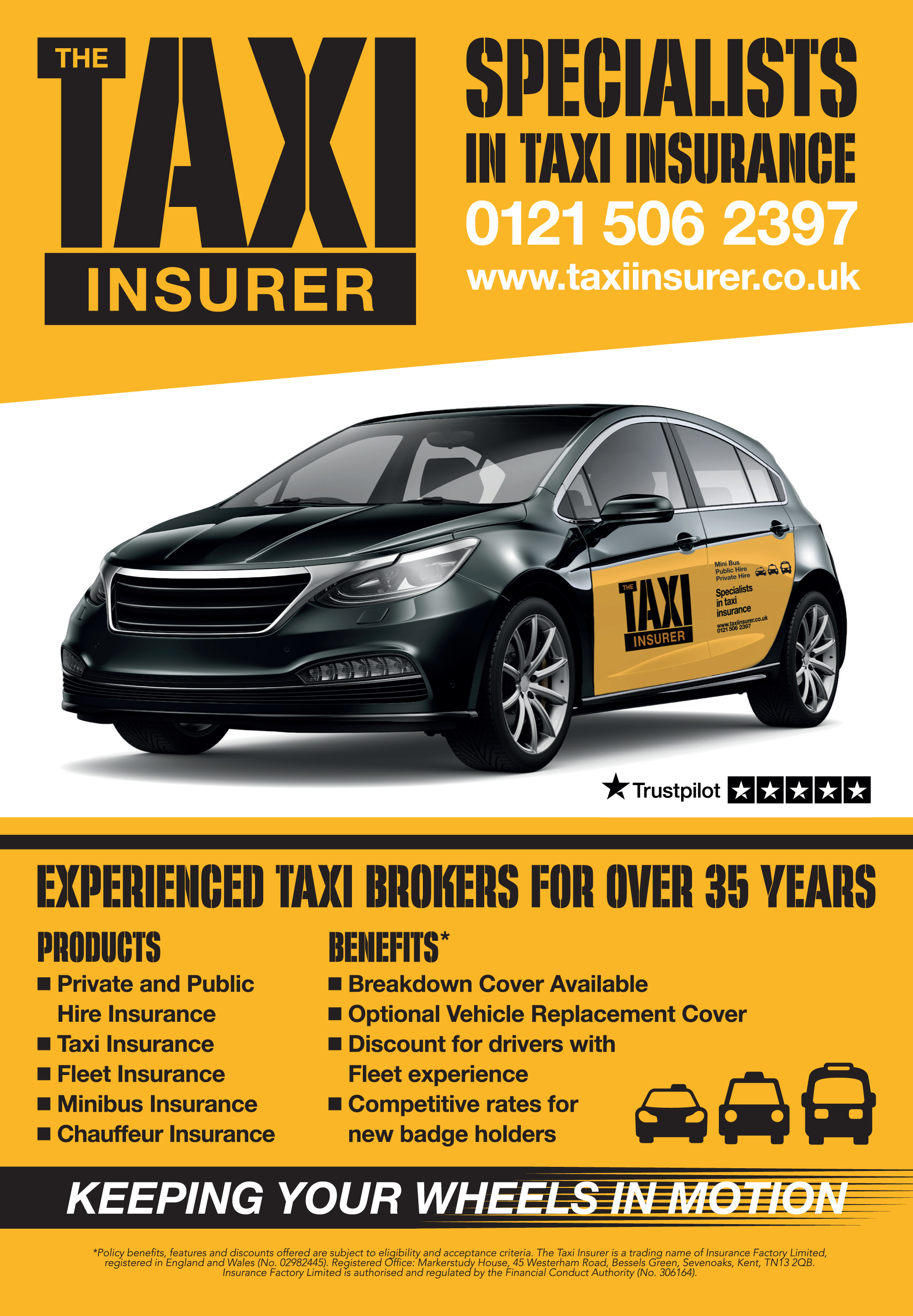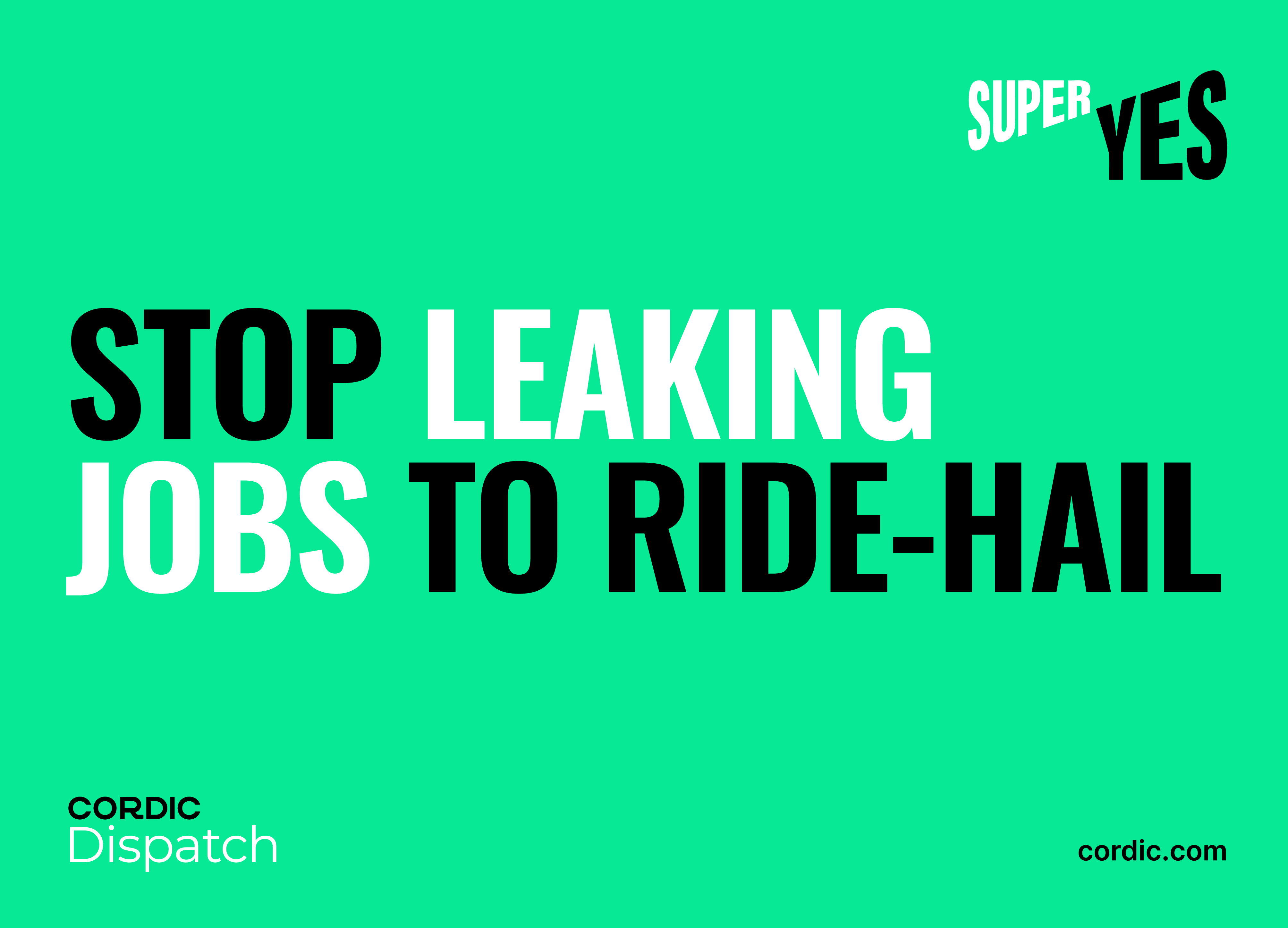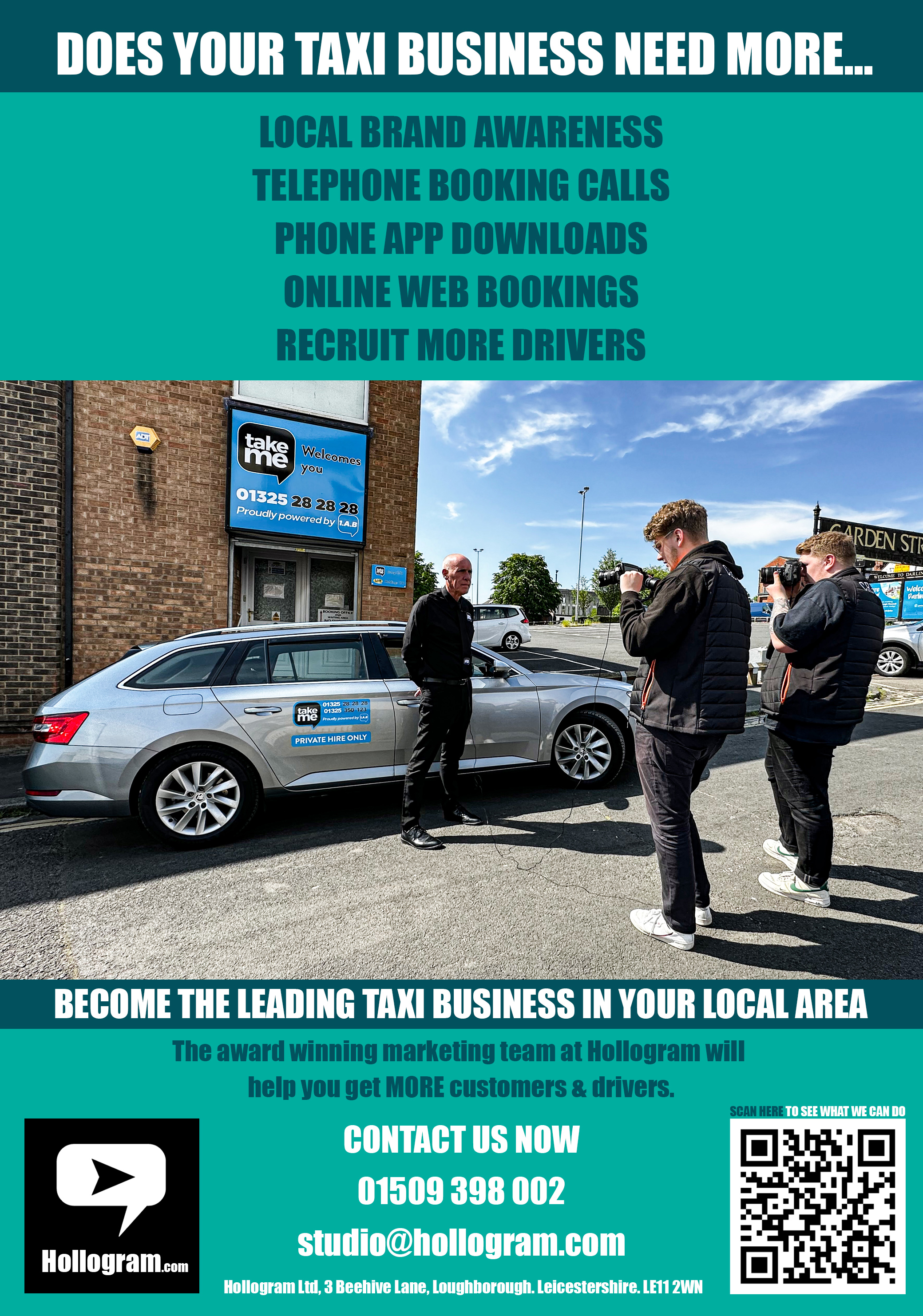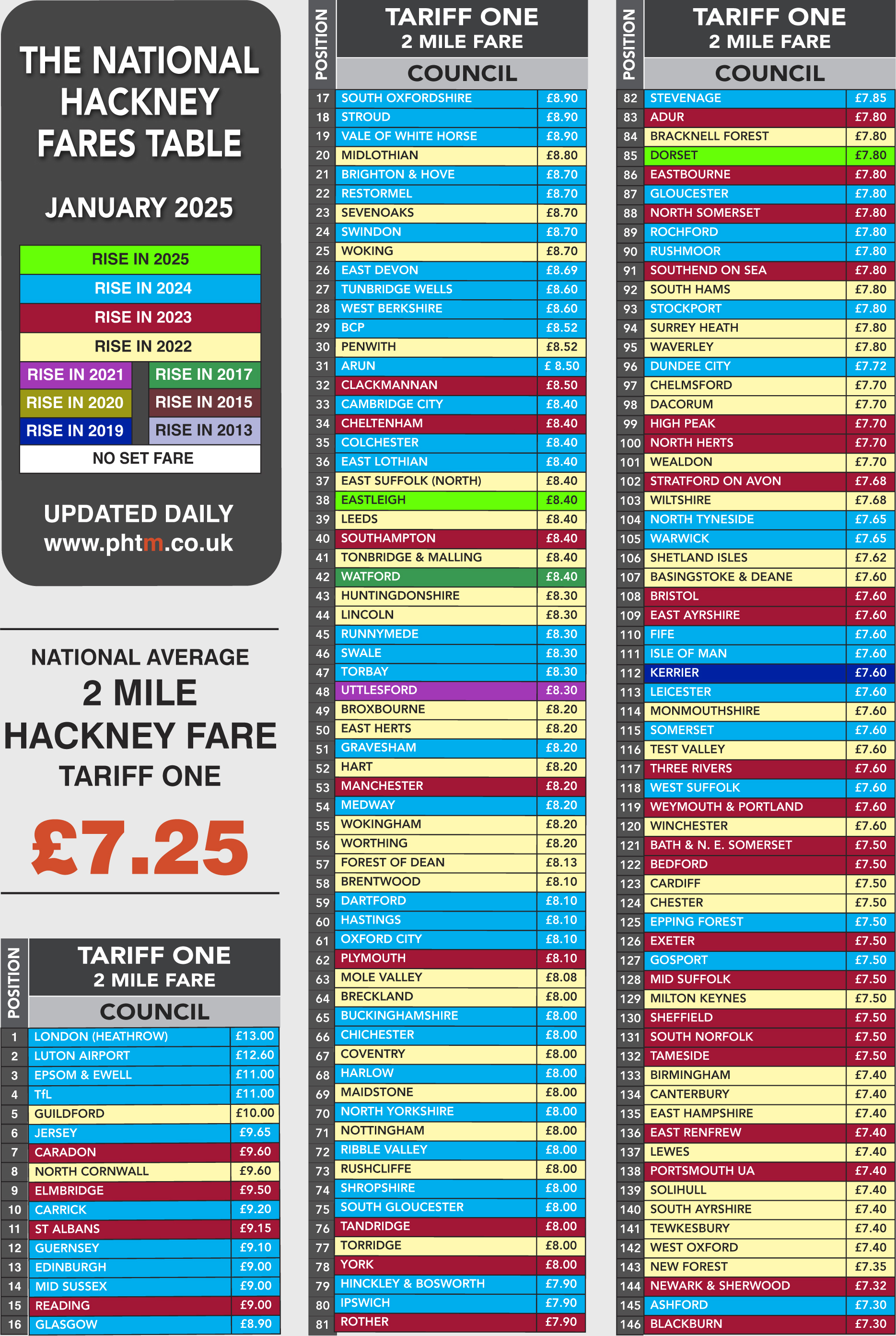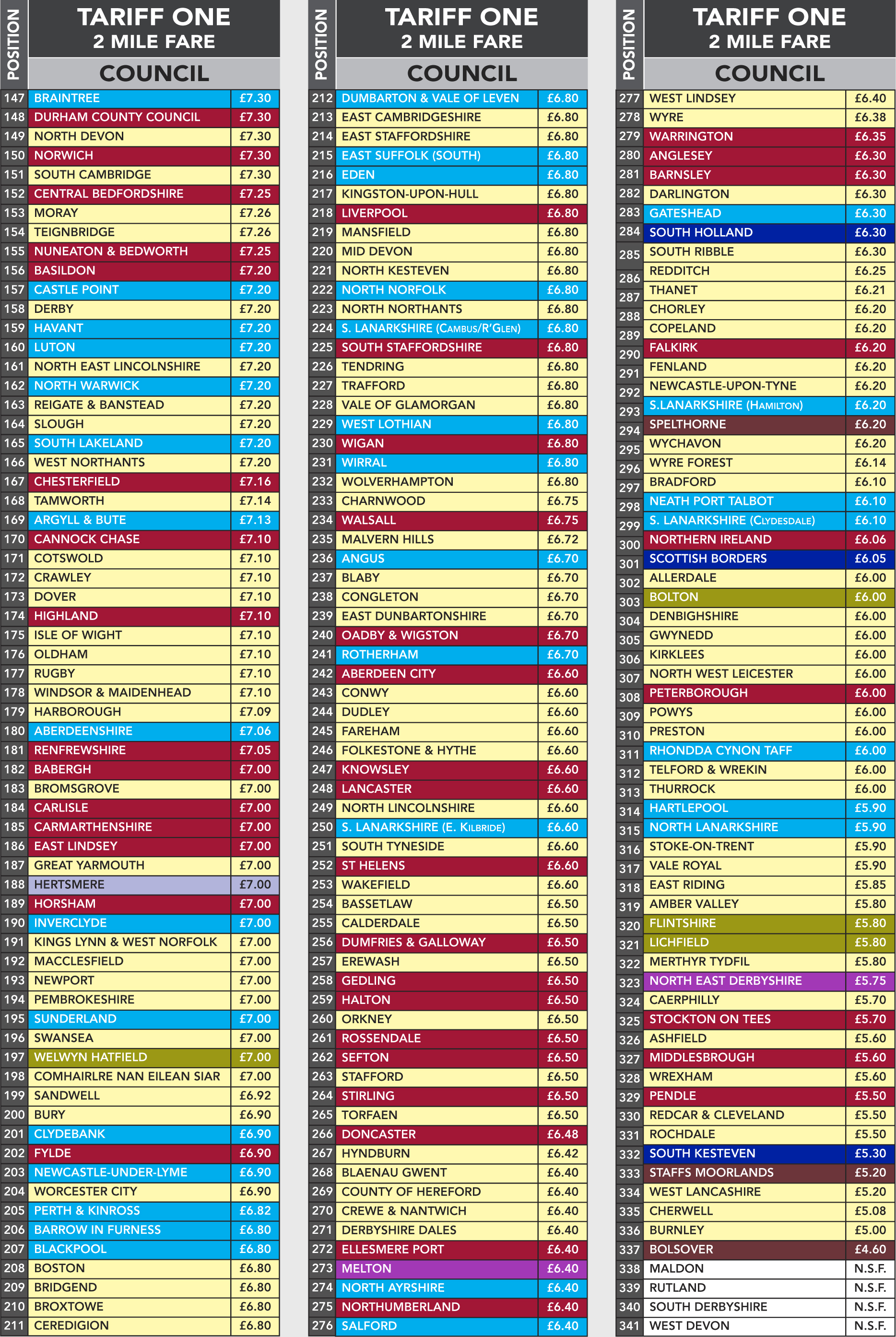
PHONE FRIENDLY VERSION - SCROLL VERTICALLY
EDITORIAL FEATURES
Click each article to go directly to story
- ALL THINGS LICENSING
by Mike Smith IoL - BRIGHTON CAB TRADE VIEW
by Andy Peters - COMBATTING MULTINATIONAL APPS
by Ateeq Naseem - IT’S TIME TO UNITE
- KNOW YOUR RIGHTS
by Patterson Law - LETTERS TO PHTM
- MANAGE ONLINE REVIEWS
- NPHTA: VIEWS ON DEVOLUTION
by Dave Lawrie - PAYMENT TECHNOLOGY
by CabCard Services - SOCIAL MEDIA SAVVY
by Phil Holloway - STOP LEAKING JOBS TO RIDE-HAIL
- TECH PREDICTIONS FOR 2025
by Amer Hasan - WHATSAPP SMART MESSAGING
by M2M Smart Messaging
NEWS FEATURES
Click each article to go directly to story
- AIRPORT AILMENTS
- BERNIE THE BOOK
- BUS LANE BULLETIN
- CLASSIFIEDS
- FIT AND PROPER
- HACKNEY FARES LEAGUE TABLE
- JUST DESERTS
- ROUND THE COUNCILS
- ROBOTAXIS/FLYING TAXIS
- SHAME SHAME
- TERROR TIMES
- UBER UPDATE
- WORLDWIDE TAXI FOCUS
All advertisers must comply with the British Code of Advertising practice. The views expressed in this publication are not necessarily those of the publishers. All rights reserved.
TECH PREDICTIONS FOR 2025
By Amer Hasan CEO of minicabit minicabit.com
A happy 2025 to you, described by the Chinese Zodiac as the Year of the Snake. Indeed, it could be a slippery year, navigating the various economic and political challenges in the UK and abroad.
As CEO of minicabit, Britain’s largest cab aggregator, this is coming up to my tenth year of aiming to predict the tech changes in our sector, always a difficult endeavour. However, I ended my predictions two years back with a mention of ChatGPT and the rise of Artificial Intelligence (AI) - from an incremental presence last year, it’s fair to say it will start to more visibly transform our everyday use of technology this year, in leisure and work. iPhone and Android operating systems will roll out features with AI embedded even deeper, for instance reading your calendars and emails to evolve into a quasi Personal Assistant, automatically scheduling/updating appointments. But AI will also start to offer baseline business skills equivalent to work agents, called ‘agentic’ services. Examples include accounting packages, that automate basic bookkeeping for continual expense tracking, invoicing and compliance.
However, perhaps the most relevant area for the cab sector is with AI agents which can replace a lower level customer service agent with reading/responding to customer queries across live chat and, surprisingly, voice calls. Yes, we’re getting to the stage an AI bot can imitate a human voice to answer calls, complete with some charm, hesitation and even chuckles - whilst a discerning ear might still distinguish this from the real thing, the gap is closing. It’s fair to say Customer Service software will start to be transformed this year, potentially reducing staffing costs for cab operators - time will tell if/when job dispatch and negotiating with drivers will be fully managed by AI bots!
The other area that will start to be impacted by AI is how people access websites and apps. Google, for the first time since its launch over 25 years ago, is starting to face intense competition in its core offering, online search, where it has long commanded a 90% share amongst online search engines. AI-driven search from ChatGPT (and smaller rivals such as Perplexity and Anthropic) is seriously disrupting this, especially amongst younger generations, which gives the specific answer to queries rather than links to websites to find the answer themselves. Google is fighting back with its own AI search bot, Gemini, until recently a separate website and app - now it will start to blend Gemini within its main search form. And Google’s initiatives, such as a trial codenamed Project Mariner, will instantly complete forms for you across multiple websites, reducing the need for you to visit/book across different providers, for instance, for a travel itinerary. So navigating this change will be a key focus for all businesses this year.
Whilst AI will start to impact our industry’s back office, the ‘front end’, the cab driver that is, will escape its clutches at least for the next couple of years. Self-driving cars went through a hype cycle a few years back, only to face the squeeze of technological progress lagging the $billions of investments made into the sector. With General Motors subsequently shutting down its Cruise platform, this leaves Google-owned Waymo and Amazon-owned Zoox as the main players of scale (outside China) in the self-driving race...though things could change from this year. Tesla previewed its Cybercab vehicle last year which runs off its full self-driving software that is already deployed in its consumer cars. Tesla’s chief, Elon Musk (no stranger to hyperbole), is proclaiming that he can activate regular Tesla cars and Cybercabs onto an Uber-style ‘Tesla Network’ app initially in the US, for consumers and local fleets to own and rent out as they wish for cab services (akin to renting out your property on Airbnb). In theory, this could present a rival to Uber, disrupting them on cost and availability, though Uber is pitching this as another provider to offer in its own app - indeed, it already offers Waymo in select US cities, competing with them in others.
The one challenge to easily rollout an autonomous cab network is complying with regional differences in US transport regulations. With Musk cannily backing Trump into the White House, his bet is that Trump pushes for such regulations to be managed centrally, potentially expediting the rollout of autonomous cab services that could either impact or boost Uber (which itself has invested in UK autonomous software platform, Wayve).
All this said, history shows that AI can’t easily wipe out the premium appeal of personal service - lower quality coffee from vending machines hasn’t replaced demand for the higher quality offered by cafe baristas, and tour guides prevail despite the wealth of online information on a city. So far from making the cab driver extinct, those drivers and operators who sincerely strive to offer the best customer service can command a premium in the market...as it’s always been, and can always be.
VIEWS ON DEVOLUTION
Article by Dave Lawrie Director NPHTA 0161 280 2800 info@nphta.co.uk
Welcome to 2025, we hope you all had a busy, safe and profitable festive period, now we look to the year ahead and what it will or indeed will not bring.
On 16 December 2024, the Government issued the English Devolution White Paper, announcing reforms which will have a significant impact on every council and community and setting out an Enhanced Devolution Framework.
We think this white paper is the “levelling up” consultation that we have been promised for the last few years. It should have had an aim to address the subject of cross-border working’ instead, it is “devolution,” which is more about planning, rail and bus services, education, back to work plans, business investments, removing borders, and more to the point: placing all powers in the hands of Regional Mayors, which is not what we were expecting.
It does not actually address or reduce cross-border working, instead it would remove the borders, effectively agreeing with and adopting the “regions” or “zones” adopted by Uber.
We may well see that local authorities disappear, instead creating districts or regions, with powers shifted from central government (Whitehall) to regional mayors for the likes of Greater Manchester, Lancashire, West Midlands, East Midlands, Humberside etc.
Having read the entire document, which let me tell you, takes some reading, taxi and private hire gets a very small mention - two paragraphs to be precise:
Taxi and private hire vehicles
“Taxis and private hire vehicles are an important part of our transport networks and some of the most vulnerable groups in our society rely on them. We recognise there are concerns about out-of-area working by private hire vehicles and are exploring how best to address these concerns. As part of this, we will consult on whether to make all Local Transport Authorities (including Strategic Authorities) responsible for taxi and private hire vehicle licensing.
“Administering taxi and private hire vehicle licensing across this larger footprint would increase the consistency of standards and enable more effective use of enforcement powers across a whole functional economic area. Greater economies of scale should also enable authorities to improve the efficiency of licensing, reducing the incentives for people to license out of their usual working area. This would be a significant change for the sector, and we will work with stakeholders to understand possible impacts before taking a final decision. In London, taxi and private hire vehicle licensing is already the responsibility of the Mayor and Transport for London.”
What is “the footprint”?
We do not believe this will address the problem at all, in fact, where we have seen other regions “combine” such as BCP and North Yorkshire, we have watched as the problems become far worse than they ever were. The issue right now is cross-border working within the private hire sector, where a vehicle and driver licensed by one area, is working entirely in a different area, only seeing their issuing authority region at application or renewal stage.
If this removal of boundaries goes ahead, then the issue will expand to hackney carriages too, since there will be a far wider footprint within which they can use ranks and be flagged down. For example, why would someone sit on a taxi rank in an area where there is no nightlife, train stations, airports or tourism, when they would be able to sit on a rank in Blackpool, Preston or anywhere else within their “zone”?
This then has a devastating impact on the end user, the elderly and vulnerable within rural districts, as there will simply be little to no available vehicles in the area.
Standardised regional conditions
The attempted introduction of minimum licensing standards in Greater Manchester, to date has not been accepted by all ten of those councils and is still having massive impacts on the trade within those regions. We see differences in age limits, tinted window restrictions, CCTV requirements, first aid kits, fire extinguishers, colour of vehicles, mixed fleets for hackney carriages, variations on fees and fares, bus lane access for private hire, the list is endless.
What might change?
If we look a little deeper, what does this mean for you, what changes could we see? Well for a start, if the local council is lost, then so are their conditions and policies, which as we know, some are so ludicrous and mismatched it is worrying, but we could see that where one of the councils has a reasonable age limit for vehicles, this could be lost
Fees going up?
Where the fees are lower than those of a neighbouring authority, they could see their fees go up to match the higher one as it would become one authority. As we all know, it is very rare that fees go down.
Fares leading to pay cuts
We have seen the fares “average out” from the previous single authorities to a regional fare card, which means that if one was £2 per mile, and another £6 per mile, the average becomes £4 per mile. This means a pay cut from £6 to £4. But it also means less affordability for the elderly where the fares jump from £2 to £4, also resulting in a pay cut.
Confusion and poor organisation?
We have members from regions where this joining up, levelling up or devolution of licensing has already taken place, suffer the consequences of the change. These include ranks being flooded, to “some” of the vehicles being allowed to do their compliance (or MOT) tests from any of the garages within the previous areas, whilst some are not, since whilst they joined some “zones” they did not join all requirements. We have also seen some have to go and buy first aid kits and fire extinguishers, whilst others have not needed them.
Will this stop people licence shopping?
“Greater economies of scale should also enable authorities to improve the efficiency of licensing, reducing the incentives for people to license out of their usual working area.” No, we do not believe that it will at all, since those migrating to other areas for a licence, do this not just due to lack of efficiency, they do it for cost, and they do it to comply with what they consider to be more reasonable conditions.
Summing it up
Overall, the white paper means little to us an industry, with very little mention of us at all and it would seem even less understanding of the cross-border working issue and how to address it.
We have seen the James Button plan, effectively removing licensing from being local by nature, instead adopting a national licensing body. In our view this White Paper is merely suggesting a mix between the Button plan and “Uber zones.”
Would the triple lock rule remain?
If this White Paper goes ahead, then it is effectively undermining the triple lock rule, since it shifts licensing to vast regions instead of local districts, effectively rendering the triple lock rule (driver, vehicle and operator licences must all be issued by the same council) meaningless.
Is there a solution?
We believe that if the government genuinely wants to address the cross-border problem, then the fastest and easiest solution would be to roll out intended use policies to ALL licences. Where currently such a policy can only be implemented against hackney carriage drivers, we believe it should apply to private hire drivers and private hire operators too.
Having such a policy in place does not “stop” the ability to perform work out of area at all, it merely stipulates that “most,” not “all” of the work must be within the licensed area.
What about the local transport plans?
We have seen mention in various government papers including this one, “Taxis and private hire vehicles are an important part of our transport networks and some of the most vulnerable groups in our society rely on them.” and in the recent “call for ideas” document released on 28 November, which can be found here: https://shorturl.at/Bfhmf
This consultation ends on 30 January, and indeed in the best practice guidance of November 2023, that taxi and private hire services should be considered with the development of any local transport plans, but we have yet to be included in any of them as far as we can see.
Transport plans include bus lanes
We have published articles about allowing use of bus lanes for private hire vehicles, but to date, there are still very few councils that have this in place. We even suggested that this ability could be limited to locally licensed private hire only, local benefits for locally licensed drivers, but even that has not seen any changes.
So when are taxis and private hire vehicles going to be included in local transport plans?
JUST DESERTS
COMMUNITY SERVICE FOR HIGHLY REGARDED LAWYER WHO ASSAULTED JERSEY CABBIE

A 56-year-old “highly regarded” advocate in Jersey has been sentenced to 130 hours of community service after drunkenly assaulting a taxi driver.
David Samuel Steenson pleaded guilty to common assault in the Magistrate’s Court, admitting to punching the driver, who sustained multiple cuts and bruises to his face.
The incident occurred on 13 November, after Steenson, who’d been celebrating with colleagues, took a taxi home, initially talking amicably to the cabbie.
Merry van Woodenberg, prosecuting, said when they reached his home and the driver asked for payment, the atmosphere changed.
“Mr Steenson was confused about how to pay. The taxi driver waited for some five minutes, then said he was going to take him to the police station.
“Mr Steenson started to grab at the steering wheel and the gear stick.”
The court was shown footage in which Steenson punched the driver while shouting in a panicked voice: “Let me out of this car!”
The driver suffered “serious but not permanent injuries” and had a CT scan which showed no lasting physical damage.
The driver is now fearful about returning to work and is nervous about the passengers he carries.
Defence attorney Paul Nicholls, said Steenson suffered from acute claustrophobia leaving him very nervous in enclosed spaces. He said: “One wonders why the driver didn’t just let him out.” He asked for community service, citing Steenson’s remorse, impeccable character, and the fact that this was a first offence.
Magistrate Bridget Shaw acknowledged Steenson’s remorse stating: “I accept this was a panicked reaction.” She also ordered him to pay £2,420.
FINE FOR DRUNK ARMY MAJOR WHO GRABBED STAFFS CABBIE IN RAGE AS HE DROVE HER HOME
A senior military officer has been convicted of assaulting a cabbie during a terrifying, alcohol-fuelled incident. Major Lianne Robinson, 38, pleaded guilty to battery after grabbing the driver’s neck and issuing death threats.
The incident occurred on 9 June 2023, after Robinson attended a wedding. Highly intoxicated, she hailed a taxi near Swynnerton, Staffs, and demanded to be taken home to Shifnal.
During the journey, Robinson became increasingly aggressive, verbally abusing the driver and demanding he change course.
She grabbed his neck and told him: “I’m in the Army, I will f***ing kill you,” repeatedly telling him to turn around “right now” and called him a “f***ing c***”.
The terrified driver had noticed Robinson was wearing formal military ‘mess’ wear and genuinely feared that she was “capable of killing him”, prosecutor Suzanne Francis told the court.
The terrified driver, phoned his office, who called the police, and he drove to the taxi firm’s office to wait for officers there.
Robinson was arrested and in interview said she’d no recollection of the incident due to the amount of alcohol she had drunk.
Dashcam footage captured the harrowing incident, including Robinson’s threats and abusive language.
In court, the driver detailed the significant impact the attack had on his mental health and work life.
He now suffers from anxiety and has reduced his working hours due to fear of similar incidents.
Mitigating for Robinson, Debra White said the defendant was “mortified by her behaviour” on the night and “desperately sorry” for the impact it had on the driver.
She had no previous convictions and had led an “exemplary” career in the Army for many years.
Judge Recorder McConaghy condemned Robinson’s behaviour, describing it as “utterly appalling” and “arrogant.” He ordered Robinson to pay a fine of £1,500 and compensation to the driver of £1,000. She must also pay £250 towards the costs of bringing the case to court.
DONCASTER WOMAN JAILED FOR 44 MONTHS FOR VIOLENT TAXI DRIVER ROBBERY

A Doncaster woman has been sentenced to over three years in prison after attacking and robbing a taxi driver.
The victim was strangled with a wire and punched multiple times in the face during the incident.
The assailant, Casey Wilkins, 28, also stole the driver’s change bag and wallet before fleeing the scene. She was arrested shortly after and found to have hidden the stolen money on her person.
Wilkins pleaded guilty to robbery and was sentenced to three years, eight months in prison at Sheffield Crown Court on 2 December.
DC Joseph Albutt said: “This was a violent and unprovoked attack on an innocent man who was simply doing his job.
Thanks to the victim’s cooperation and the quick action of our officers, we were able to apprehend the offender and bring her to justice.”
DUNGANNON WOMAN JAILED FOR FOUR MONTHS FOR HAIR PULLING TAXI ATTACK AND BILKING
A Dungannon woman who assaulted a taxi driver and fled without paying has been sentenced to four months in prison. Margaret Melissa Stokes, 31, appeared at Craigavon Magistrates’ Court on 29 November, via video link. She admitted charges of common assault and making off without payment.
The court heard that on May 28, 2023, the victim picked up Stokes in Banbridge and drove her to Portadown. When the driver offered to use a card reader for payment, Stokes became aggres-sive, pulled the driver’s hair, and left without paying the fare.
CCTV footage identified Stokes as the culprit. She was arrested and denied the allegations, despite police evidence linking her to the incident.
The court noted her extensive criminal record, which included 18 offences since March 2023.
District Judge Michael Ranaghan emphasised the seriousness of her actions and imposed a four-month sentence and a £25 offender levy.
12 MONTHS’ JAIL FOR ST HELENS THUG WHO KICKED CABBIE AND THREATENED HIM WITH ACID ATTACK
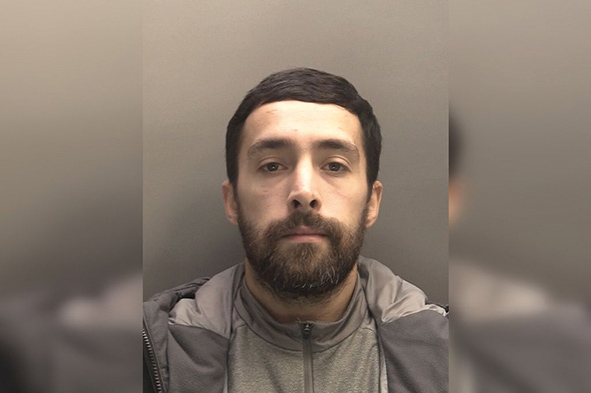
A man who kicked a taxi driver and threatened him with an acid attack has been jailed for 12 months. Calvin Elliott, 31, from Rainhill, racially abused and assaulted Ahmed Shebaz after the driver asked him to leave his drinks outside the vehicle in the early hours of August 12, 2023.
Elliot was aggressive towards Mr Shebaz, repeatedly bringing up his race and religion. He asked Mr Shebaz to stop the car, and then jumped out.
At Liverpool Crown Court on 18 December, prosecutor Nick Cockerell said: “Elliott kicked the door then opened it and repeatedly kicked Mr Shebaz. The defendant then pulled at the windscreen wipers on the vehicle.
Following the attack, Elliott called Britannia Taxis, the driver’s employer, and launched a racist tirade, threatening to throw acid and vowing to “peel his face off.”
He also made threats against the taxi company itself saying: “I’ll set fire to the place, watch.”
Elliott, who has five previous convictions, pleaded guilty to racially aggravated assault and sending malicious communications intending to cause distress.
He was sentenced to three months for racially aggravated assault and nine months for malicious communications.
STOP LEAKING JOBS TO RIDE-HAIL
AN OPEN LETTER TO THE TRADE

The ride-hailing steamroller is winning business from traditional fleets all over the world. If it’s not taking passengers and drivers from you yet, how long before they do?
Acting alone, independent fleets can’t hope to compete with ride-hailing money, crazy discounts and billion dollar brand awareness.
But there is a way forward.
It’s time for the smart fightback
We’re on a mission to help independent fleets compete and grow in the face of the ride-hail threat.
Cordic is majority owned by operators, for operators - our interests are aligned with your interests. Our business only succeeds if there is a successful growing independent trade to support.
So that’s why we’re being clear about what we offer:
Get the tools to take on ride-hail
Cordic offers two products aimed squarely at helping fleets take on ride-hail
- • Cordic Dispatch
- • SuperYes job sharing
1. Cordic Dispatch - escape ride-hail’s clutches
Do you want to be running your business on a system owned by Uber?
Do you want your money going to a company owned by the biggest ride-hail player out there?
Instead... get the rock-solid, flexible and feature-rich dispatch system not owned by Uber.
Find out more at cordic.com/dispatch
2. SuperYes - a share a day keeps ride-hail away
We all know that driver and passenger loyalty is hard to win and so easy to lose. Every job you can’t cover and have to say no to is an opportunity for ride-hailing to take work from you. It’s time to say yes more. It’s time to say SuperYes.
Being able to say yes to passengers is what brings in money and keeps them coming back. And keeping drivers busy is what keeps them happy. But having enough drivers at key times and in the right place is a real challenge.
SuperYes is for ALL independent fleets
SuperYes is the new name and new vision for what was the CabFusion Network. It’s based on the simple insight that we all want to say Yes more:
SuperYes to more passengers
SuperYes to more drivers
SuperYes to more money
It means thinking differently about what matters in a ridehailing world. Holding onto old rivalries with local firms misses the point. There are bigger battles to face. And win.
Teaming up by saying SuperYes to job sharing gives you access to a way bigger fleet and the ability to keep more of your customers happy.
SuperYes works whichever dispatch system you’re on.
Join SuperYes and supersize your fleet so you can say yes to more passengers, keep more drivers happy and compete on a level playing field.
Get started at cordic.com/superyes
Let’s grow together
We believe that passengers are best looked after by a thriving, local private hire industry where operators know their customers and compete to provide the best possible service. And that drivers have personal relationships with local companies that know and care about them.
So let’s stop leaking jobs and get the tools to take on ride-hail. If you’re interested in learning more or have any suggestions you can get in touch at cordic.com/book-a-demo
Here’s to the smart fightback.
Simon Veingard
CEO, Cordic
IT’S TIME TO UNITE
F.A.O. LOCAL OPERATORS AND DRIVERS, LICENSING OFFICERS AND THE UK GOVERNMENT

I am writing this letter as a plea to you ALL to make 2025 the year we unite to work together to save our industry before it’s too late!
BACKGROUND:
I personally began my journey as a private hire driver in 1990 and established my first private hire company in 1991. Over the years, I have dedicated countless hours to ensure its success. Now, 33 years later, our company has welcomed many local operators into our fold, including those with a rich heritage dating as far back as the1920s.
Together, we represent over a century of history; 250 drivers, working as a close-knit family, aiding one another to serve and support our local community in our charming southern market town - far removed from the hustle and bustle of larger major cities.
We have been lucky, historically we have not had to contend with ride-hailing apps such as Uber. However, recently that dynamic has shifted dramatically.
We now face a formidable competitor determined to dominate the UK taxi and private hire industry at any cost.
THE FUTURE:
This company has deep pockets and can offer loss making incentives to gain new customers such as free trips and 80 per cent off fares plus ongoing special offers. Their strategy hinges on the belief that if they provide rides with large discounts or for free, the general public has no loyalty to their local firms and will flock to use them.
This company uses unscrupulous recruitment tactics. It has a dedicated team called ‘Sales, Growth & Expansion - small cities team UK ‘ whose employees come to a town and book rides with local firms, and during the journey endeavour to entice these drivers to join them with the promise of large financial rewards, often initially paying inflated rates for jobs to secure their allegiance.
However, once they have built a large local database of drivers, they then lower fares to an unsustainable level, forcing these same drivers to work excessive hours just to earn a basic living wage.
As a community of local operators, we simply do not have the financial resources to compete with these aggressive tactics. The reality is that if we try to match these discounts and offers, we risk driving ourselves into bankruptcy resulting in a race to the bottom.
LOWER FARES, COMPETITION AND POTENTIAL GOVERNMENT INTERVENTION:
Here are a few points for us all to consider:
- • Unfair competition: Lower fares by ride hailing apps such as Uber create a challenging environment for traditional taxi services, which struggle to compete with the subsidised rates. This situation could lead to reduced options for consumers in the long term if traditional services are forced out of the market.
- • Impact on drivers: While lower fares may benefit consumers in the short term, they can adversely affect drivers' earnings. Many drivers rely on competitive pay to support their livelihoods, and continuously low fares might lead to financial strain.
- • Market saturation: Uber’s pricing strategy may lead to an oversaturation of ride-hailing services, which can disrupt local economies and reduce the overall quality of service as drivers grapple with inconsistent earnings.
- • Long-term effects: Short-term benefits from lower fares might not lead to sustainable competition in the transportation market. It is essential to analyse the long-term implications for consumers, drivers, and traditional taxi services.
- • Consumer perspective: While consumers may appreciate lower fares, they should also consider the potential downsides, including the impact on driver earnings and service quality.
- • Regulatory oversight: Other country’s governments have already taken legal action to try and protect their established taxi trade.
Uber has been banned in countries such as Bulgaria, Hungary and Denmark, and restricted in others such as Australia, Italy and Spain.
It is imperative that the OUR government now considers implementing regulations that ensure fair competition in the UK transportation market. This may involve establishing minimum fare requirements or providing support for traditional taxi services to adjust to the new market dynamics.
IT’S TIME FOR ACTION
We must engage with members of parliament and local and national TV plus printed and digital media to highlight our plight. We must pressurise them to speak up about the unfair advantage that companies such as Uber hold over us and the potential consequence for everyone if nothing is done.
IT’S TIME TO UNITE...
It’s time for members of trade to unite to advocate for a fairer and more equitable industry.
It’s time for members of our trade to unite to ensure a sustainable future for our industry in order to maintain a legacy for our families that we have all worked so hard to build.
IT’S TIME FOR US ALL TO WAKE UP AND FIGHT FOR OUR INDUSTRY’S SURVIVAL BEFORE IT’S TOO LATE!
Contact: WeMustUniteTaxiPH@outlook.com
Thank you
A concerned private hire operator
PAYMENT TECHNOLOGY
CABCARD’S INGENIOUS APPROACH REVOLUTIONISES DRIVER RENTALS AND SAVES 100s OF WORK HOURS
Article by CabCard Services www.cabcard.services

In the ever-evolving world of taxi operations, time is indeed money. From the front office to the driver’s seat, every second saved can make a significant difference. For years, fleet operators have grappled with the time-consuming task of sorting driver rentals, making it an area ripe for innovation. CabCard has taken up this challenge, transforming the way fleets handle driver rentals and in the process saving operators hundreds of hours each week.
At its core, the problem of driver rentals revolves around balancing two competing debts: the driver owes the fleet for commission or rental, while the fleet owes the driver for account work. In a small operation, managing these balances is relatively straightforward. Yet, as fleets grow and the number of drivers increases, the complexities multiply exponentially. Each driver’s account must be calculated individually, a process which demands meticulous attention to detail and significant manpower.
For instance, consider a typical fleet - let’s call them ‘Fleet X’. With hundreds of drivers, Fleet X found itself investing an inordinate amount of time each week to sort out driver rentals. Their process, like hundreds of fleets across the country, involved drivers attending their offices every week, often queuing at busy times to pay their weekly rental over to the fleet’s accounts office.
By seamlessly integrating with their existing dispatch software, CabCard provided a solution to this time-drain issue. Instead of Fleet X having to deal directly with each driver and sorting their rentals manually, they replaced this weekly task by simply downloading a CSV file from their dispatch software with details of rentals owed. This file is then uploaded to CabCard’s payment system. All achieved in a matter of seconds and with just a few clicks the once mammoth task of collecting driver rentals becomes astonishingly simple.
CabCard cleverly automates the next crucial step: communication and payment. The system is designed to automatically send an SMS text to each individual driver detailing the rental amount they owe. The driver clicks on a link within the SMS and can pay securely online at any time, whether day or night through the CabCard system. The fleet operator can view all rental payments that have been paid on a real time basis as they’re made and drivers who have not paid can be quickly prompted by the fleet to make their payment.
Once driver rental payments are paid and received, CabCard streamlines the final step of the process by directly paying the total of all the driver rentals over to the fleet. This automation not only saves time and aggravation, but also adds a level of security that manual payment methods can’t match.
By harnessing the power of CabCard’s payment technology this process of driver rentals has been revolutionised for taxi fleet operators The benefits are tangible: operators save time, money, and stress, while also gaining improved security. In the case of our typical ‘Fleet X’, CabCard has transformed an arduous task into a smooth, streamlined operation, saving them hundreds of hours every week.
The continual evolution of the taxi industry requires adaptive, efficient solutions for managing the often intricate process of driver rentals. CabCard is meeting this challenge head-on with an innovative approach that harmonises and simplifies this vital component of fleet operations. By optimising communication, automating payment processes, and providing real-time transparency, CabCard is enabling operators to save valuable time and effort.
COMBATTING GLOBAL APPS
By Ateeq Naseem,
Albatross Cars, Derby
ateeq@albatrosscars.com
“Know your enemy and know yourself, and victory is never in doubt, not in 100 battles.” This timeless wisdom from Sun Tzu’s The Art of War resonates deeply as we navigate the challenges posed by multinational taxi apps in the private hire industry. Understanding the strengths and weaknesses of these global competitors, while staying true to our own values and capabilities, is the key to securing our future.
The threat of multinational giants
Just as Kodak, Blockbuster, and Toys R Us faltered against shifting landscapes, traditional private hire businesses face similar challenges from multinational apps with extensive resources. But history proves that even giants can fall. Those who thrive are not always the biggest but the ones most attuned to change, innovation, and customer needs.
Kodak: a lesson in complacency
Kodak was once the leader in photography, but its failure to embrace digital technology sealed its fate. Despite inventing the digital camera in 1975, Kodak feared it would disrupt its lucrative film business. Competitors seized the opportunity, and Kodak filed for bankruptcy in 2012.
For PH operators, the lesson is clear: resist complac-ency. Albatross Cars has invested in technology offering seamless booking experiences, while preserving the personal touch multinationals struggle to provide.
Blockbuster: ignoring the digital shift
At its peak, Blockbuster was the king of video rentals. Yet, it failed to see the potential of Netflix’s streaming model, dismissing it as a niche trend. By 2010, Blockbuster was bankrupt, while Netflix redefined entertainment globally.
Private hire companies must recognise the inevitability of digital transformation. However, we hold an advant-age through our local roots and personalised service - qualities that multinational apps often overlook.
Toys R Us: neglecting customer experience
Toys R Us dominated the toy industry but neglected the shift to online retail and failed to offer memorable customer experiences. Competitors such as Amazon thrived by providing convenience, while smaller players offered personalised services.
Similarly, in the private hire sector, success isn’t just about convenience. At Albatross Cars, initiatives such as the “Xmas Wishes in Motion” campaign and sponsorships of grassroots events, strengthen our connection to the community, making us more than just a transportation service.
Albatross Cars: a model for resilience
Reflecting on 2024, Albatross Cars demonstrated that resilience lies in community engagement and adaptability:
- • Supporting community initiatives; we celebrate local achievements
- • Promoting Inclusivity; we reflect our commitment to fostering unity and diversity
- • Building trust; collaborating with Derbyshire PCC on community safety shows dedication to local concerns
These efforts enhance our brand and foster loyalty with customers who value businesses that give back.
Innovation and community: the Winning Formula
To combat multinational giants, private hire businesses must blend innovation with community focus.
- • Leverage local expertise: multinational apps lack the understanding of local areas that smaller operators possess. Tailored services, e.g. support for community events, give local companies a distinct advantage.
- • Enhance digital capabilities: while staying true to your brand, invest in technology to match the convenience offered by global players. User-friendly apps, transparent pricing and reliable service build trust and customer retention.
- • Focus on relationships: customers value the personal connection that local businesses provide. Regularly engage with your community, listen to feedback and continuously improve.
- • Stay Adaptable: foresight and under-standing of market dynamics are crucial for staying ahead.
Looking Ahead
In 2025, the PH industry has a unique opportunity to redefine itself. By embracing innovation and remaining rooted in community values, we can carve out a niche that multinational apps cannot replicate.
At Albatross Cars, our journey continues with a commitment to growth, collaboration, and meaningful connections. Here’s to a future where local businesses not only survive but thrive, proving that knowing oneself and one’s environment is the ultimate strategy for success.
AIRPORT AILMENTS
STANSTED AIRPORT TO INTRODUCE BARRIER FREE DROP OFFS WITH ANPR TECHNOLOGY
London Stansted Airport is set to revolutionise its drop-off experience in January with the introduction of an ANPR system.
This new technology, mirroring the successful implementation at the Dartford Crossing, will allow drivers to seamlessly pass through the Express Set Down (ESD) area without the need to stop and pay at a barrier. This move comes on the heels of a significant £1.1 billion government investment an-nounced in October, paving the way for an airport extension.
“We’ve observed the effectiveness of ANPR systems in settings, from bridges and toll roads to other airports,” said Anita Harrison, Stansted Customer Ops Director.
The airport recently announced its capacity ambitions, aiming to accommodate between 48 and 51 million passengers annually by 2040. Ms. Harrison emphasised that the barrierless system will “significantly reduce wait times and improve passenger flow.”
The new system will operate on a pay-by-midnight policy, meaning drivers will have until the following day to settle the drop-off charge.
The current charges remain unchanged: £7 for up to 15 minutes and £25 for longer durations.
Payment options will include online and phone transactions, plus auto-pay accounts for frequent users, such as taxi drivers.
CRAWLEY COUNCIL SEEKS LEGAL ACTION AGAINST UBER OVER GATWICK AIRPORT BUSINESS
Crawley BC is exploring legal options over Uber drivers operating from Gatwick Airport without the proper local licences.
Airport taxi drivers licensed by the council, gathered outside the town hall on 11 December, to voice their frustrations and demand more enforcement of licensing laws.
They claim Uber cars registered in London are taking a significant portion of airport business, impacting their livelihoods.
Don Barnes, a local driver for Airport Cars and Unite branch secretary, stated that the issue has been ongoing since 2020, with a formal complaint filed with the council’s licensing team in March.
Don said that the current situation is ‘taking the livelihoods’ of local taxi drivers, adding: “The situation is massively impacting me. It’s killing us.”
Cabinet member for public protection, Yasmin Khan, confirmed that an investigation was launched in June and is currently underway. The council is now seeking legal advice to determine the appropriate course of action.
While officials claim to have provided updates to Unite, Mr. Barnes refuted this claim.
The drivers conducted themselves well during the meeting - even though their mood was not helped by one councillor showing up to the town hall in an Uber.
One driver compared the situation at the airport as like “the wild west” and questioned the levels of health and safety being observed.
To applause from his colleagues, the driver said: “We’re all being let down - massively let down.”
Cllr Khan acknowledged the drivers’ concerns and promised to follow up with the investigating officers.
Mr Barnes added that he intended to join other drivers at the next council meeting in January to keep pushing for answers on the issue.
MANCHESTER AIRPORT - new pick-up charges
From 17 December 2024
Up to 15 mins: £6.20 • Up to 30 mins: £8.00
Up to 45 mins: £9.50 • Up to 1 hour: £12.40
WARNING: £100 charge applied for attempting to pick up passengers in drop-off zone.
HEATHROW AIRPORT - new drop-off charge
• From 1 January 2025
• Increase from £5 to £6 per visit
• Applies to all vehicles entering drop-off areas in front of the terminal buildings
• Applies: 24 hours a day, 365 days a year
LETTERS TO PHTM
EX-PRIVATE HIRE VEHICLE FINED FOR DRIVING IN BRADFORD CAZ
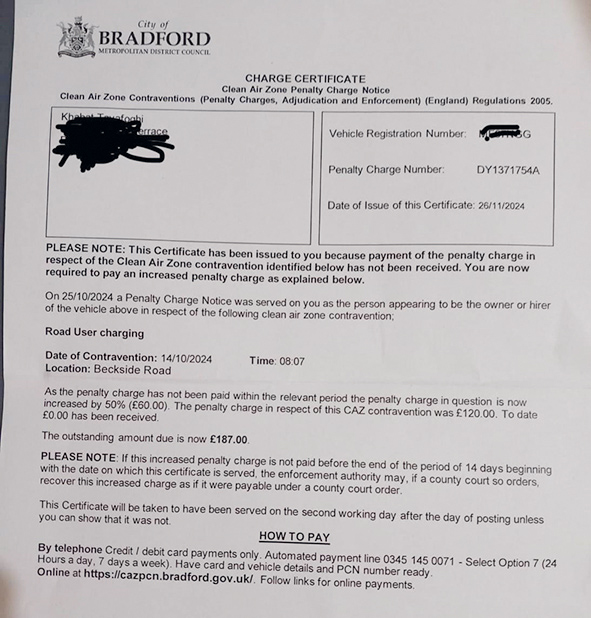
Dear PHTM
In theory, when a licensed PHV is sold, the proprietor should tell the relevant local licensing authority that the vehicle has been sold. The local authority should then remove the vehicle from its system as a licensed vehicle, but in practice this never happens. My friend bought a used Skoda from a car trader a month ago and to date he has received twenty three CAZ fines from City of Bradford MDC for using this vehicle as his private car. He is NOT a private hire driver.
The clean air zone GOV.UK website only gives information if the vehicle needs to pay a clean air zone charge and how much the charge should be. BUT there is no procedure in place on government’s website or any other system in place to explain how to get a vehicle removed when it is sold.
We don’t have any details of previous owners or which council it was registered with.
In the photo in the CAZ fine notice you can clearly see that the the car is not a private hire vehicle as it has no stickers or signage, but Bradford council insists the fines must be paid. Can anyone please advise where the new owner can get some help to get the vehicle removed from the database in order to stop receiving these fines.
UBER INSTALL GEOFENCE ON WEYBRIDGE STATION APPROACH AFTER ARTICLE PUBLISHED IN PHTM

Dear PHTM
Thank you very much for publishing our story about the Weybridge train station taxi rank in PHTM November issue.
After being ignored for so long the article brought great attention from all parties involved - our licensing team at Elmbridge BC, South Western railway who we pay for our station permits, and TfL Uber.
We have always had great support from the local Conservative Party but after the article we had numerous talks and meetings about our issues with all parties resulting in Uber putting a geofence on Station Approach at the station.
Now, If any Uber vehicles are parked and plying for hire on Station Approach they will not receive new jobs from the train station. To get a new job, the Uber driver needs to be outside the train station.
Another positive development is that the drop-off and pick-up zone is now outside the train station, on the other side of the bridge.
We were extremely happy about these new restrictions. However we have now noticed that Uber drivers are completely ignoring the drop-off and pick-up point outside the station. They are still coming to the station, blocking us, and sometimes even occupying our taxi rank.
The next meeting with the licensing team, councillors, and taxi drivers is planned for January 2025. All parties will continue discussing increasing to a one-mile geo-fence around the station and how to address our continuing problems with TfL-Uber vehicles at the station.
I would like to thank PHTM for your support, we will keep fighting and will let you know what happens
Kind regards,
Miroslav Podlecki
Elmbridge HC Driver
BUS LANE BULLETIN
READING HACKNEY CARRIAGE DRIVERS BID FOR BUS LANE ACCESS ON A33 REJECTED
A proposal to allow taxi drivers to use bus lanes along a key route in Reading has been turned down by the local council. The A33 bus lanes, which run between Rose Kiln Lane and the M4 Junction 11, are designed to speed up public transport and potentially accom-modate future tram services.
A petition signed by 231 people was submitted to the council’s traffic management sub-committee by the Reading Taxi Association (RTA). It argued that taxis should be included as a form of public transport and granted access to the bus lanes.
RTA chairman, Asif Rashid, high-lighted the importance of taxis for those unable to use other modes of transport and the potential for more efficient journeys on the A33.
While Labour councillors sympathised with the petition, there was concern allowing taxis to use bus lanes would jeopardise the prospect of trams being introduced.
The request was opposed by the council’s highways team, which raised concerns that taxi drivers would swerve into regular traffic lanes to avoid buses stopping to pick up and drop off customers.
Mr Rashid contended: “We have shown through our continued use of other bus lanes that this is not the case.
“Hackney carriages, by law, is a form of public transport. The problem is that not everybody can use alternative modes of transport. We want to work safely along the A33 corridor.
“We’ve been trying to get this for years and every time we’ve been knocked back.
“By excluding hackney carriages, the council is inadvertently undermining the very objective it aims to achieve by reducing congestion, promoting sustainable transport and ensuring equitable access to mobility.”
Ultimately, councillors rejected granting taxis access to the A33 bus lanes by a majority vote at the meeting on November 27.
BATTLE FOR PRIVATE HIRE VEHICLE ACCESS TO PORTSMOUTH BUS LANES CONTINUES
Following the decision by Portsmouth City Council to deny private hire drivers further bus lane access, the Cabinet Member for Transport, Cllr Candlish (LibDem), had his decision “called-in” for review by the Scrutiny Management Panel (SMP) on 11 November.
At the meeting in October - attended by over 100 PHV drivers - Cllr Candlish was cautioned by numerous councillors that there was a lack of data and financial reports to justify any decision, and that to proceed would inevitably result in any decision being “called-in” (a process that requires a SMP to question the decision in detail, and for the Cabinet Member to justify his decion).
A “call-in” requires the signatures of five councillors, and a detailed report laying out the reasons.
The move (only the third time in ten years) was led by Cllr. George Madgwick [Ind Leader), supported by four other councillors and a highly detailed five page report, highlighting the numerous errors made by Cllr Candlish, and the multiple contradictions in the officers’ own reports, and clear lack of supporting evidence.
Having heard from all parties, and after much rigourous questioning, the SMP voted by a majority to “refer back” the decision to the decision maker for reconsider-ation. The SMP set out in writing the nature of its concerns that are to be addressed.
Peter Sutherland [Uber Drivers’ Trade Rep] declared the decision by the SMP to be a pleasing partial victory, stating: “It’s a significant victory for common sense.
“At the original meeting, Cllr Candlish was cautioned numerous times by councillors that there was no evidence to support such a decision, and that to proceed risked a call-in. We’d heard, days before the meeting, that Cllr Candlish had already taken his decision, and that was obvious during the Transport meeting. Absolutely no heed was taken of anything said by other councillors or in depositions, which shows a disregard for the democratic process.
“I live in hope that a compromise can be reached. If not, then the fight will go on.”
VICTORY FOR COMMON SENSE AS TAXIS ALLOWED TO USE BELFAST BUS LANES OVER CHRISTMAS
In a bid to alleviate traffic congestion in Belfast city centre, particularly over Christmas, Infra-structure Minister John O’Dowd announced a temporary measure allowing taxis to use certain bus lanes. The Temporary Traffic Regulation allowed Class A and Class C taxis to use certain lanes, effective from 6am on 18 December.
Announcing the move on 17 December, Minister O’Dowd said: “I am committed to bringing forward measures which will help alleviate the traffic congestion in the city centre. I had previously announced my intention to introduce a pilot scheme to permit taxis to use city centre bus lanes to help support the industry and ease traffic.
“My officials are continuing to carry out the necessary legislative work and the consultation period for that scheme will commence very early in the new year.
“DfI will continue to work closely with partners in the coming days and weeks. We all share a common goal of wanting to keep Belfast moving, while balancing the needs of everyone who needs to use the city’s roads and footpaths.”
One of Belfast’s biggest taxi firms, Fonacab, had called for bus lanes to be opened up in a bid to help ease ongoing traffic congestion.
DERBY PRIVATE HIRE DRIVERS FURIOUS OVER UNFAIR BUS LANE RESTRICTION
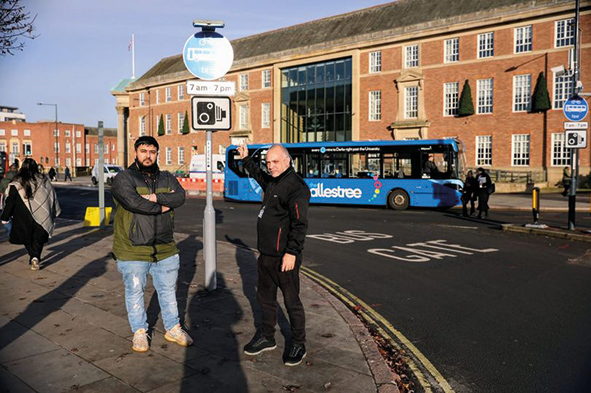
Private hire drivers in Derby are expressing anger and frustration over a city centre bus lane that they claim is “ridiculous” and “unfair.” The drivers argue that the bus gate restriction on Corporation Street is causing them to lose customers and get stuck in unnecessary queues.
The road between Derby Council House and the Assembly Rooms is designated for buses, taxis, cyclists, and pedestrians between 7am and 7pm. Signs and cameras are in place to enforce the restriction, and motorists caught using the road during these hours face fines.
While the signs indicate that taxis are permitted to use the road, Derby City Council has confirmed that this does not apply to PHVs.
The bus lane restriction has been in place since 2021 and has generated significant revenue for the council.
Last year it was reported that the city council collected £1.7 million from CCTV-monitored fines in just over a year.
Driver Lee Roach, with 25 years of experience, explained that the Assembly Rooms and Quad are key drop-off points, and the restriction forces them to take longer routes, increasing fuel costs and frustrating passengers.
Adnan Khan, another private hire driver, echoed Roach’s concerns, emphasising that he is licensed by the council but is not allowed to use the bus lane, despite performing the same job as hackney carriage drivers.
Several drivers have recently complained about the situation, prompting their union represent-atives at GMB to get involved. Craig Thomson, a GMB union officer, expressed hope for a meeting with the city council to discuss these concerns. He highlighted that while the council has profited from fines, private hire drivers are facing unnecessary delays and increased costs.
Derby City Council maintains that allowing private hire vehicles to use bus lanes could negate the benefits of the restriction.
A spokesperson said that the Corporation Street scheme reduces traffic congestion, allowing buses to operate more efficiently and promote sustainable travel.
The spokesperson added: “Hackney carriages differ from private hire vehicles, which can be confused with other cars. If private hire vehicles were allowed into the bus lanes, the sheer volume of these vehicles could negate the benefits for buses and potentially create congestion in bus lanes.”
FIT AND PROPER
UNLICENSED KINGS LYNN PH DRIVER TO PAY OVER £2,000 FOLLOWING UNDERCOVER STING
An unlicensed PH driver operating in the Great Massingham area has been ordered to pay over £2,000 after an undercover investigation by West Norfolk Council.
Kevin Turner was caught transporting undercover council officers twice and admitted to operating as a PH driver without a licence, operating an unlicensed and uninsured vehicle.
On 9 October, King’s Lynn Magistrates’ Court found Turner guilty in his absence of all charges.
He was fined £1,100 and ordered to pay £990 in costs and surcharges. Turner also received eight penalty points on his driving licence.
HENLEY REGATTA PH DRIVER FINED £2,000 FOR ILLEGAL RIDES
A PH driver must pay over £2,000 in a fine and costs after being caught illegally plying for hire at the Henley Royal Regatta. His driving licence was also endorsed with six penalty points.
Muhammad Naeem, from High Wycombe, was convicted in his absence at Oxfordshire Magistrates’ Court on 13 December.
The court heard on 5 July, South Oxon DC licensing officers saw a Toyota Auris in a prime location displaying a Bucks Council plate.
In a test purchase they offered to pay £60 to go to Reading without a booking which Naeem accepted.
Naeem was not licensed by SODC, furthermore, the inflated fare indicated a clear intention for personal gain.
MIDDLESBROUGH COUNCIL REJECTS TAXI LICENCE APPLICATION OVER IMMIGRATION CONVICTION
A man has been denied a taxi licence by Middlesbrough Council due to a previous conviction.
The man was convicted in 2013 of “conspiring/assisting unlawful immigration into an EU member state” and sentenced to 15 months’ imprisonment.
According to the minutes of a recent licensing committee meeting: “The applicant appeared before committee as a result of a previous criminal conviction recorded on his DBS certificate”.
He allowed his brother to pay rent to live in his flat and “to work in the applicant’s business, despite being in the country illegally”.
The applicant admitted lying to immigration officers and when the matter went to court, the committee deemed his actions a serious act of dishonesty, making him unfit to hold a taxi licence.
REDCAR AND CLEVELAND PH DRIVER LOSES LICENCE OVER LINK TO SUPPLY OF ILLEGAL BACCY
A PH driver has been stripped of his licence after being linked to illegal tobacco sales. Redcar and Cleveland Council said it received information from trading stan-dards about the driver being involved in the sale/supply of illicit tobacco and vaping products.
A spokeswoman said that the person concerned had been licensed to drive PHVs in the borough for four months before his licence was revoked. She added: “We do not have any evidence to suggest that any sale took place while the person was a licensed driver.”
It’s unclear whether the driver received a criminal conviction for the illegal sales, but licensed drivers must within seven days disclose to the council in writing details of any conviction or caution imposed on them by a court.
FIT AND PROPER
CABBIE SUSPENDED BY SOUTH GLOS COUNCIL PICKED UP 1,000 MORE PASSENGERS
A cabbie suspended by South Glos Council after receiving 50 complaints continued to work for an app company, picking up an around 1,000 more passengers.
The driver was suspended by a council panel but was able to continue working whilst appealing.
The problem was raised during a regulatory committee meeting on November 14 where councillors called for a review of the com-plaints process which allows a driver to work during the 28-day appeal period.
DAWLISH TAXI FIRM OWNERS NAMED BY TEIGNBRIDGE DC AFTER LOSING LICENCES
A couple who jointly ran Dawlish taxi firm, Grab A Cab, have had their licences revoked by Teignbridge DC. Michael and Grace Miller lost their HC proprietor and driver licences following complaints alleging aggressive and abusive behaviour and intimidation.
The council revoked the licences in September, as the Millers no longer met the “fit and proper” criteria.
Despite previous fines, warnings and prosecutions, the committee determined that the Millers had consistently disregarded rules, showing a “blatant disregard” for the law and public safety.
The revocation decision was upheld at an appeal hearing, where evidence of complaints dating back to 2020 was heard.
ASHFORD CABBIE LOSES APPEAL AGAINST LICENCE REVOCATION AND INCURS £4,000 COSTS
An Ashford cabbie has lost his appeal against the revocation of his taxi driver’s licence by Ashford BC.
On 22 November, Margate Magistrates’ Court heard that Tashil Hashemi, who had held a licence since 2011, had become the council’s “most complained about driver”. The complaints included: rude/abusive language; refusal of fares; poor driving standards; parking on a rank; obstructive behaviour.
His driver’s licence was revoked in January 2024. Mr Hashemi appealed the decision, represent-ing himself at the hearing, but failed to convince the court that he should have been considered fit, with some of the behaviours, e.g. attempting to prevent a licensing officer from inspecting his HC.
The court dismissed the appeal and Hashemi was ordered to pay £4,000 in costs within 28 days.
MIDDLESBROUGH PRIVATE HIRE DRIVER WHO PAID SEX WORKER £50 LOSES LICENCE
A Middlesbrough cabbie has had his licence revoked after he paid a sex worker £50 and “engaged in sexual activities” with her.
The driver appeared before Middlesbrough Council’s licensing committee in relation to an incident, on February 15. Footage showed “a lone female getting into a vehicle which drove to a car park. The occupants then walked to an electrical substation, emerging shortly afterwards,” the minutes stated. The man then drove off.
The cabbie confirmed in an interview in June that he was the driver and had paid £50 in cash for sex after finishing work. He “stated this was a one-off incident and apologised for his actions”.
The minutes said: “Whilst no criminal conviction or charges had been brought against the driver, the act was considered so serious that it was the committee’s decision to revoke his licence with immediate effect.”
ROBOTAXIS / FLYING TAXIS
GM PULLS PLUG ON CRUISE ROBOTAXI, SHIFTS FOCUS TO PERSONAL VEHICLES
General Motors has announced a significant shift in its AV strategy, halting funding for its Cruise self-driving taxi service. The company will now redirect its focus towards developing autonomous technology for personal vehicles.
The decision comes amid increas-ing competition in the robotaxi market, notably from Tesla’s recent unveiling of its Cybercab. GM cited the “considerable time and resources” required to scale the business as a key factor in the shift.
The move could impact a substantial number of Cruise employees, though GM has not yet disclosed specific figures. The company also plans to increase its ownership in Cruise to over 97%.
Cruise has faced a series of set-backs, including a significant job cut in December 2023 and a temporary halt to its driverless testing programme in California following a pedestrian accident. The company also admitted to submitting a false report to US authorities regarding the incident.
Cruise co-founder Kyle Vogt, took to social media to express his disappointment, calling GM executives “a bunch of dummies.”
GERMAN FLYING TAXI STARTUP VOLOCOPTER FILES FOR INSOLVENCY
Volocopter, a leading German developer of electric vertical take-off and landing (eVTOL) aircraft, announced on 30 December that it had filed for insolvency.
This news comes just days after fellow German eVTOL company Lilium was rescued from bankruptcy by a consortium of European and North American investors through Mobile Uplift Corporation, a company set up to acquire the operating assets of the startup’s two subsidiaries, Lilium GmbH and Lilium eAircraft GmbH.
Terms of the deal, expected to close in January, were not disclosed.
Volocopter stated in a press release: “Despite recent intensive fund-raising efforts, finding a viable solution to maintain regular operations outside of insolvency proceedings has not been possible,” The insolvency filing was made on 26 December.
Founded in 2011, Volocopter has been a pioneer in the eVTOL sector, aiming to launch its two-seater "”Volocity” air taxi in 2025. However, the company encountered a significant setback in summer when it was forced to cancel planned test flights during the Paris Olympics due to delays in obtaining engine certification.
Volocopter announced in December that the Volocity model had met 75% of the certification requirements set by the European Union’s Aviation Safety Agency.
Volocopter’s insolvency filing highlights the challenges faced by German eVTOL companies in competing with rapidly advancing rivals in the USA and China.
WAYMO TO LAUNCH ROBOTAXI SERVICE IN MIAMI IN 2026
Waymo is expanding its robotaxi service to Miami. The Alphabet-owned company plans to test AVs with human safety drivers in Miami in 2025, followed by the launch of its Waymo One ride-hailing service in 2026.
This demonstrates Waymo’s growing confidence in its technology’s ability to navigate challenging weather conditions and complex urban environments. The company’s previous testing in Miami in 2019 helped refine its AVs’ performance in wet and rainy con-ditions, knowledge that will be applied to its upcoming deploy-ment of Jaguar I-PACE EVs.
Waymo’s expansion plans are fuelled by recent funding and strategic partnerships. It has part-nered with Uber to integrate its robotaxis into the Uber app in Austin and Atlanta, and with Moove to manage fleet operations and infrastructure in Miami and Phoenix.
Waymo’s rapid growth place it ahead of competitors such as Cruise, Tesla, Wayve and Zoox.
ZOOX ZOOMS AHEAD: DRIVERLESS TAXIS HIT SAN FRANCISCO STREETS

In a bold move that could redefine urban transportation, Zoox, an Amazon-owned autonomous vehicle company, has begun testing its driverless taxis on the streets of San Francisco. This milestone puts Zoox ahead of industry giants such as Tesla in the race to bring fully autonomous vehicles to the public.
Zoox’s unique approach involves designing vehicles “for AI to drive, and humans to enjoy,” eliminating the need for traditional steering wheels and pedals.
The company’s vision is to create a future where electric, driverless vehicles reduce traffic congestion and air pollution in major cities.
After successful test runs in Foster City, California, and Las Vegas, San Francisco is the next stop for Zoox’s robotaxis. The company has obtained the necessary permits and is now offering driverless rides to select residents.
“This marks our entrance with the robotaxi into our second com-mercial market,” said Zoox CEO, Aicha Evans. “We’re excited to begin testing our robotaxi in this wonderful city.”
While Tesla has ambitious plans for its own robotaxi fleet, regulatory hurdles and technical challenges have slowed its progress. Zoox, on the other hand, seems to have gained a significant advantage in the autonomous vehicle race.
The firm did not share a timeline for San Francisco’s market, but it intends to operate paid public rides in Las Vegas in 2025.
UBER LAUNCHES ROBOTAXI SERVICE IN PARTNERSHIP WITH WERIDE IN ABU DHABI
Uber has launched its first international robotaxi service in partnership with WeRide.
This marks a significant milestone in Uber’s ambition to integrate a wide range of autonomous vehicles (AVs) onto its platform globally.
The service, which debuted in Abu Dhabi in early December, will allow riders to hail autonomous vehicles through the Uber app.
Uber, however, has no immediate plans to extend its partnership with WeRide beyond the UAE.
While the vehicles will initially be operated by safety drivers, both companies aim to transition to fully driverless operations by 2025. The fares for these autonomous rides will be comparable to Uber’s standard UberX and Uber Comfort options.
WeRide, a Chinese-based AV startup, has secured permits to operate driverless vehicles in several countries, including the UAE, Singapore, China and the US. The company’s collaboration with Uber is a testament to Abu Dhabi’s commitment to embracing smart city technologies and fostering innovation.
As the service scales, both Uber and WeRide plan to gather data to refine their autonomous systems, ensuring safety and efficiency for future deployments.
After shelving its own self-driving car programme in 2020, Uber’s strategic shift towards becoming a platform for AVs has led to partnerships with several companies, including Cruise, Waymo, Motional, Avride, Serve, Cartken and Nuro.
This approach gives Uber the opportunity to offer a diverse range of autonomous mobility options to its customers.
“By integrating autonomous vehicles from different operators onto our platform, we aim to provide customers with diverse and innovative mobility options,” Uber said in a statement.
IN THE NEWS
DONCASTER MAN JAILED FOR AIDING SPEEDING DRIVERS, INCLUDING CABBIE, DODGE PROSECUTION

A Doncaster man has been jailed for his role in a speeding fine scam that helped more than a dozen drivers avoid prosecution. Khuram Yaqoob, 35, (pictured) provided false names and addresses to speeding drivers, allowing them to escape penalty points. The scam, ran between 2017-2019 and netted Yaqoob thousands of pounds.
Yaqoob was described as the “central figure and ringleader” of the conspiracy by Judge Jonathon Rose at Bradford Crown Court.
He was sentenced to three years and four months in prison after admitting conspiracy to pervert the course of justice. The scam was uncovered in 2019 when Yaqoob was arrested for firearms offences and his phone was seized which revealed details of the speeding fine scam.
A total of 18 individuals, including Yaqoob, were sentenced on 3 and 4 December. Among the drivers sentenced was Idris Yousaf, 45, a Huddersfield PHV driver, who was jailed for six months after the court heard he could have faced disqualification from driving if he had three more points on his licence.
Yousaf, from Golcar, paid Yaqoob a total of £290 for him to deal with his Notice of Intended Prosecution (NIP) after he was caught doing 36mph in a 30mph zone.
Judge Rose emphasised the need for “deterrent and punitive sentences” for those who undermine the justice system.
MAN JAILED FOR HELPING BRADFORD CABBIE TO COVER UP RUNNING RED LIGHT

A man has been jailed for more than two years after he tried to help a Bradford cabbie to avoid prosecution for running a red light in the city.
Atique Khan, 44, (pictured) was locked up for his role in the bid to pervert the course of justice, but the cabbie, Kashif Khan, was spared jail after a judge said he was very lucky not to be following his co-accused into custody.
In July 2021, Kashif Khan’s Lexus was caught on another driver’s dashcam running a red light on the A650 in Bradford. The incident was reported to the police, but after Kashif Khan received a NIP, the pair embarked on what was described by Recorder Patrick Palmer as “sophisticated, determ-ined and planned” offending.
The NIP was returned naming another driver and with an address which the judge was told had been used in similar nominations more than 170 times between April 2019 and April 2024.
The subsequent police investigation linked Atique Khan to the address and he was said to have provided it to Kashif Khan to mislead the inquiry.
After suspicions were raised another NIP was sent out in January 2022 and this time Kashif Khan nominated a different man at another address which police also had to check out.
The court heard that Atique Khan, who had previous convictions for perverting the court of justice and fraud by false representation, was also linked to the second address.
In an interview with Bradford Council’s taxi licensing department Kashif Khan put forward what Recorder Palmer said was “a third story” claiming that his vehicle had been taken to a garage to be repaired at the time of the red light offence.
Recorder Palmer said it was clear that the two defendants had “put their heads together” to provide another story.
Atique Khan, from Bradford, admitted a charge of conspiracy to pervert the course of justice and was jailed for 26 months.
The court heard that Kashif Khan, 30, had no previous convictions and Recorder Palmer sentenced him to 18 months in prison, suspended for two years, after he admitted perverting the course of justice.
Kashif Khan, who is no longer a cabbie, must do 250 hours’ unpaid work and comply with 25 rehabilitation activity requirement days. He must also pay costs of £360.
IN THE NEWS
NOTTINGHAM TAXI DRIVER’S GOOD DEED REUNITES MAN WITH VITAL BELONGINGS

A Nottingham man wants to track down the taxi driver who helped to reunite him with his emergency rescue pack.
Karl Kershaw, of Radford, got a taxi back from the city centre on Thursday, November 14, but it wasn’t until after he got home that the 46-year-old realised he had left important medication and personal items in the taxi.
Karl explained: “I carry an asthma bag with me, three inhalers, medication, air buds, a leaflet and a spare bank card.”
As it was an independent taxi Karl had no idea who the driver was or how to get in contact with him.
Before he was able to track the taxi driver down he was admitted to hospital for a short while, during which he was surprised to get a call from his neighbour on Monday, November 25. He was told that a man had been around the area describing Karl and asking if anyone knew him.
It turned out this man was the taxi driver who had dropped Karl off a few weeks prior and was trying to find him to give him back his bag.
Karl has now been reunited with his bag and although his medication could be replaced, he was especially concerned about his earbuds and bank card.
Karl said: “I really want to find this taxi driver and just say thank you. For that taxi driver to come to a high rise flat and track me down two weeks later, it must have taken him some effort.
“I would love to pay him the fare for the journey he took just to return this. He had been hunting me down for two weeks.”
Karl is really impressed by the driver’s actions, and added: “It gives you a reminder that there are nice people out there.”
Karl is keen to find the taxi driver and is urging him to get in touch.
TWO MEN DRIVE LONDON TAXI TO ABU DHABI FOR F1 FINALE RACKING UP £37,000 ON THE METER!


Steve ‘Baggsy’ Biagioni and Mark McCann, two passionate motor-sport enthusiasts, have driven a classic London black cab from the UK to Abu Dhabi to attend the final round of the Formula 1 World Championship.
Their epic 4,500-mile journey saw them traverse multiple countries, including Iraq - totting up over £37,000 on the cab’s meter!
Their adventure highlights their love for motorsport and their determination to turn an unconventional idea into reality.
The black cab has navigated deserts, highways and international borders to reach Yas Marina Circuit.
UBER UPDATE
BLACKPOOL TENSIONS ESCALATE AS UBER DRIVER CLAIMS HE WAS THREATENED BY CABBIES
Tension persists in Blackpool’s taxi industry as an Uber driver alleges a frightening confrontation with local cabbies. The incident, which reportedly occurred in November, involved two taxi drivers blocking the Uber driver’s vehicle on Bispham Road and threatening him with a metal pole.
Blackpool Council granted Uber a licence to operate in August after determining the operator was suitable to hold an operator’s licence. The council said it was legally obligated to issue the licence after Uber met all the necessary criteria for a private hire operator’s licence.
“We are licensed now and we are here to stay,” the Uber driver said.
However, Blackpool taxi driver Neil Charnock dismissed the claims as unfounded rumours.
“I cannot think of anyone stupid enough to commit such an offence,” he stated. Until these allegations are investigated, we should leave them as just rumour. Most vehicles have cameras, so you would expect the alleged offence would be caught on camera.”
Charnock urged anyone with information to report it directly to the police.
UBER GETS GREEN LIGHT TO OPERATE IN HARTLEPOOL
Controversial plans by Uber to expand into Hartlepool have been approved by the local council despite opposition from existing taxi firms.
The ride-hailing giant will operate from the Hartlepool Enterprise Centre. The decision was made by the council’s regulatory services committee, despite concerns raised by local taxi drivers about potential safety risks and the impact on the local industry.
Matthew Freckleton, head of cities for Uber UK, defended the company’s plans, highlighting its “dynamic pricing” model and the rigorous background checks conducted on drivers.
Both Uber and council officers stressed enforcement action can be taken against drivers where offences are found to have occurred, with the information uploaded to a national database.
The application went before the panel as it falls outside the scope of the local authority’s current private hire and hackney carriage licensing policy. This states such licences will only be granted to applicants who have an “operating base”, which is classed as a “building that it is used for the taking of private hire bookings”, within the local authority area.
A response from Uber noted “all private hire bookings will be managed through our app and records will be maintained within Uber’s computerised record system” as there will be no physical service in the Hartlepool office.
Local taxi firms, such as 23 Taxis, argued that a public consultation should be held before any changes to the policy are made. They said: “If you just grant a licence against your own policy, that doesn’t seem to be quite right to me.”
The council has assured the public that it will monitor Uber’s operations closely and take enforcement action against any drivers who violate the rules.
UBER TO PAY $271.8M TO AUSTRALIAN CABBIES IN VICTORIA SETTLEMENT
The Supreme Court of Victoria has rubber stamped an agreed settlement reached between Uber and more than 8,000 taxi drivers.
The night before the class action lawsuit had been scheduled to go to trial in March, Uber agreed on the settlement with the taxi drivers who had alleged the company set up in Australia illegally and in doing so, caused them financial harm. The settlement was reached without admission of liability by Uber.
In announcing her decision on the $271.8m payout on 2 December, Supreme Court of Victoria Judge, Patricia Matthews, said she had found “the settlement is fair and reasonable and in the interest of group members”.
ROUND THE COUNCILS
PERTH AND KINROSS: RURAL CHALLENGES TO EV FLEET
Perth and Kinross Council is aiming to electrify the local taxi trade as part of its Climate Change Strategy and Action Plan, but the rural nature of the region presents significant hurdles.
The local authority has set out that it is looking to “work with taxi operators to accelerate the transition to electric vehicles”. It will seek to “support taxi and private hire fleets to decarbonise and move towards low carbon fleets”.
During a recent council meeting, Conservative councillor Keith Allan expressed concerns about the resistance of taxi drivers and fleet managers to adopting electric vehicles.
“How are we going to cope with that and how are we going to achieve it?” he questioned.
Niall Moran from the council’s Transportation and Development Team acknowledged the challenges, stating: “The taxi sector is a challenge, but we can look at what has been achieved in other areas, specifically Dundee, which has a significant proportion of electric taxis.”
He emphasised that the greater mileage required in rural areas presents a unique obstacle.
However, Moran pointed to advancements in vehicle technology, such as increased range, and the expansion of charging infrastructure as key factors in overcoming these challenges.
“It’s a case of just continuing to make the case and pushing the trade as much as we can,” he stated.
SWINDON: PENALTY POINTS SCHEME APPROVED
Swindon Borough Council’s licensing committee has approved a new policy which would impose penalty points on drivers for numerous infractions and if enough points are accrued, a review of the driver’s licence could follow.
At the lowest level misusing the vehicle’s horn would attract three points, as would leaving a hackney carriage on the rank leaving a blockage.
Smoking in the taxi would attract six points, as would parking in a rank outside the licensing district and using a hand-held mobile phone while driving.
There are some sliding scale offences: poor driving standards, a hackney carriage driver refusing a fare at a rank without good reason, and failing to comply with conditions of the driver, vehicle or operator licence comes in at six to 12 points.
While abusive or improper behaviour could receive three, 12, or any number of points in between.
Licensing manager Jason Kirkwood told the committee: “When a driver has accrued 12 points unless the matter is of such seriousness that an officer decided to suspend their licence, then the officer will consider the best way forward.
“That may be a licensing review which would go to a licensing sub-committee or panel.
“This sort of scheme is being implemented by many licensing authorities across the country. The list of penalties is recommended in the statutory guidance.”
Members of the committee were concerned that drivers should be given a chance to improve and asked about standards of evidence.
Licensing officers assured them that any investigation would need solid evidence to proceed and if a licence is revoked after a subcommittee review that is appealable to a magistrates’ court within 21 days.
The committee voted unanimously to recommend the policy be ratified by the full council in February, and if it is, it will come into force on April 1.
TELFORD: PLAN FOR RESTRICTED LICENCES
New restricted licences for operators, vehicles and drivers are set to be offered in the Telford area, allowing private hire drivers to take on a limited set of services, such as home-to-school transport.
A report to councillors said restricted licences would represent a more “compelling offer” for private hire firms who only carry out certain types of work.
A licensing committee meeting on Thursday 19 December, heard that the scheme would help Telford & Wrekin Council regulate more services locally, as without it, there was a risk operators would seek to be licensed in areas with more flexible policies.
The report by the authority's licensing manager, Amitabh Singh, also said it would help ease a recruitment crisis in the trade.
The report also said that “attracting new operators with new operating models will allow the council to uphold better standards in the private hire market”.
If the policy is agreed, council officers would draw up the “conditions deemed necessary to ensure public safety”.
ROCHDALE: PLANS TO BAN POLLUTING TAXIS
Old taxis pumping out too much pollution will soon be banned from the streets of Greater Manchester - but the councils can’t force this on every cabbie.
Rochdale Borough Council is the latest council to have approved plans to ban vehicles that don’t meet the Greater Manchester emissions standards by 31 December 2025. Diesel cars made before 2015 and petrol cars made before 2006 will no longer be allowed as taxis or PHVs by the end of this year in order to reduce harmful roadside levels of nitrogen dioxide.
For those unable to meet the new standards for financial reasons, a government fund of £30.5m is proposed to provide taxi upgrades. However, councillors fear this change could have little impact on reducing emissions as a large number of PHV drivers are licensed with non-GM authorities.
The meeting of the council’s cabinet was told that drivers licensed elsewhere but operating across the region is an issue and that Greater Manchester mayor Andy Burnham is pushing the government to change legislation on this.
The officer added that City of Wolverhampton Council does have emissions standards in place - meaning some of their vehicles would meet Greater Manchester emissions standards.
Wolverhampton standards say newly licensed cars can only be 12 years’ old and vehicle renewals can only have a car 16 years’ old.
Although the Greater Manchester Combined Authority (GMCA) has an ambition to make sure every taxi and PHV in the region is licensed locally, they can’t enforce this. Andy Burnham has repeatedly stated he is confident more regulation will be brought in to curb the practice of out-of-area working.
A DfT spokesperson told the LDRS previously: “We are aware of the concerns around private hire vehicle licensing, including out-of-area working, and will be considering ways to support local authorities with the issue.”
Recently the Government released its Devolution White Paper which amongst other things hopes to reduce the incentive for operators to seek licences from areas far away from where they intend to work, thus reducing the out-of-area working problem.
A spokesperson for City of Wolverhampton Council previously said: “While City of Wolverhampton Council has never actively encouraged applications from drivers outside the city, existing legislation requires that if an application is submitted and requirements are met, then the application must be granted. The council may not refuse an applicant simply because they live in a different area.
“Applicants are usually local to the area they drive in, but many have chosen to be licensed in Wolverhampton due to our efficient, yet rigorous, licensing process.
“Public safety is of paramount importance to us. Partnership working with our licensing colleagues and other agencies shows our commitment to upholding our responsibilities; we expect drivers and vehicles licensed by us to always maintain the highest standards.”
MID SUSSEX: DRIVERS TO ACCEPT CARD PAYMENTS
Taxi drivers licensed by Mid Sussex District Council will soon be required to accept card payments from customers, following a decision made at a recent full council meeting.
The decision comes after an eight-week public consultation and aims to address concerns raised by residents regarding the safety and convenience of cash-only transactions.
The council also voted to remove the cap on the number of hackney carriages licensed in the district, a move intended to increase the availability of wheelchair-accessible taxis.
A council report highlighted a significant number of complaints received regarding drivers refusing card payments, citing public safety concerns.
While some drivers expressed concerns about connectivity issues in rural areas and potential cash flow problems associated with card payments, councillors ultimately agreed that the current licensing policy needed to be updated.
Since 2002, the council has limited the number of licensed hackney carriages to 154, with only 31 currently equipped to accommodate wheelchair users.
However, even with the removal of the cap, the shortage of wheelchair-accessible taxis may persist due to the selfemployed nature of taxi drivers.
The majority of taxi work in the district is concentrated around the three main railway stations, limiting the flexibility and availability of drivers for residents in more rural areas.
ROUND THE COUNCILS
SOUTH GLOS: HACKNEYS MUST BE WAVs BY 2025
A controversial new rule requiring all hackney carriage taxis to be wheelchair accessible is set to come into effect in July 2025, sparking concerns among taxi drivers that it could lead to a mass exodus from the industry.
The South Gloucestershire Council’s regulatory committee approved the measure on 14 November, despite ongoing concerns about the impact on local taxi services.
Many drivers have already switched to private hire in recent years, and the new regulation could further deplete the number of hackney carriage drivers available.
Disability rights advocate David Redgewell supports the move, arguing that wheelchair accessibility is crucial for individuals who have mobility impairments.
“Without accessibility, a driver would have to literally take my wheelchair to pieces and put it back together,” he said. “It’s not acceptable.”
However, taxi drivers are worried about the financial burden of purchasing or leasing a WAV.
Shashikumar Bhurton, director of Bristol Parkway Taxis, questioned the need for a blanket requirement. "Has there been any data to support that we have to all have WAVs?" he asked.
A promised survey to assess the demand for WAVs in South Gloucestershire has yet to be conducted, raising further concerns about the decision-making process.
Conservative Councillor Keith Cranney initially opposed the immediate implementation of the rule, calling for a thorough assessment of the need.
He said: "We owe it to the trade to be clear and transparent, and not just make that decision gung-ho until a survey is done.
“Until that’s we’re burnished with all the proper facts about how much disability use is needed I think we have no option but to defer.
“We’re dealing with people’s livelihoods here. Let’s be fair to all sides.”
However, after a closed-door meeting, he abruptly changed his stance and supported the measure.
He said: “Having had the opportunity to discuss our concerns, and having taken further advice from officers, I would like to withdraw my earlier motion [to defer the decision].
"Instead, I would like to propose that, if that committee is minded, we support the recommendation to update the council’s policy, so that all hackney carriages are wheelchair accessible from July 1, 2025.”
A review of the impact of the new rule is scheduled for six months after its implementation.
After the meeting, Cllr Cranney was asked what happened during the recess to lead to his change of mind. He did not provide an answer.
PETERBOROUGH: COUNCILLORS REJECT MANDATORY CCTV
Peterborough City Council councillors have voted against a proposal to make CCTV mandatory in all taxis and private hire vehicles licensed with the council.
The decision, made in a 37-8 vote with nine abstentions, came after significant opposition from local taxi drivers.
The proposed measure, which had been approved by the city’s licensing committee in September, would have required drivers to install CCTV cameras in their vehicles at their own expense.
These cameras would have needed to be operational at all times during paid fares and while waiting at hackney carriage ranks, capturing both the driver and passengers.
Taxi drivers in Peterborough expressed concerns about the additional costs associated with the CCTV systems, particularly given the current economic climate.
They also questioned the necessity of such measures, citing low crime rates in the city.
Several councillors who voted against the proposal highlighted potential drawbacks, including the risk of drivers registering their vehicles in neighbouring authorities which have less stringent regulations than Peterborough council.
They argued that this could lead to a two-tier system, undermining the purpose of the CCTV initiative.
While some councillors supported the CCTV proposal, citing potential safety benefits for both passengers and drivers, the majority ultimately voted against it.
The council did, however, agree to lobby the government for stricter national regulations on taxi licensing, aiming to prevent cross-border operations and ensure consistent standards across the country.
HARTLEPOOL: PETITION REVERSES EMISSIONS POLICY
Council chiefs are to look to alter rules on taxi age limits for certain vehicles following a petition from drivers around the cost impact of upcoming changes.
Currently Hartlepool Borough Council’s private hire and hackney carriage policy states taxis must be Euro 6 compliant by April 1, 2025.
The council’s policy also states at present a licence will only be granted for a vehicle to operate as a taxi when it is under five years old from date of first registration.
However, a petition from Khalid Hussain, from Khalid Taxis, proposed to change the council’s policy to remove the age limit for Euro 6 vehicles and instead simply state the vehicles must be in “good condition” and meet other checks.
It also looked to delay the date by which vehicles must be Euro 6 compliant.
Mr Hussain stated he has 11 taxis, eight of which are only “Euro 5” standard, and the estimated cost to replace them all in line with the council’s current age rules would exceed £80,000.
The petition was signed by 52 vehicle owners, with Mr Hussain noting “many drivers may struggle financially to make this change”, highlighting the lasting impacts of the Covid-19 pandemic.
The information went before the latest meeting of the council’s licensing committee, where officers had recommended no changes were made.
However, after hearing from Mr Hussain as well as another taxi driver, councillors decided to alter the policy to allow older Euro 6 vehicles to be licensed by the local authority, subject to them being in good condition.
It was agreed that officers would go away and draw up a revised document to reflect this and come back before the panel in March.
In the meantime, councillors decided to alter the policy to allow older Euro 6 vehicles to be licensed by the local authority, subject to them being in good condition.
Implementation of the Euro 6 emission standard was also postponed from April 2023 to April 2025 to take into consideration the financial strains placed upon the trade by Covid-19.
The council currently licenses 229 private hire vehicles and hackney carriage vehicles, 33 of these vehicles are not Euro 6 compliant.
GLASGOW: TAXI CAP MAY BE LIFTED
The city council is considering lifting a cap on the number of taxis and private hire cars operating within its boundaries, a move aimed at addressing concerns over late-night transport availability and the city's economic recovery.
A public consultation is set to be launched following a review by the Licensing Committee, chaired by Councillor Alex Wilson.
The current overprovision policy, which limits the number of licences issued, has resulted in a significant number of private hire applications being rejected.
This has sparked concerns among drivers who claim that passengers are struggling to find transport late at night. Two recent studies have highlighted a shortage of transport options as a major obstacle to the city's late-night economy recovery.
Data from January 2023 shows a decline in licensed vehicles compared to 2019, with a total of 4,584 vehicles (1,416 taxis and 3,176 private hire cars) operating, down from 5,179.
Councillor Wilson emphasised the need to reassess the current cap, stating: “Both the city centre and the taxi and private hire trade have undergone significant change over recent years and it’s my view that it’s time for a conversation on whether the overprovision caps for taxis and private hire cars are still required.
“We need to consider if they still serve the needs of the public, the trade, our city centre economy and Glasgow’s transport network. My hope is the responses to the consultation will tell us that.”
Councillor Angus Millar, convener for city centre recovery, stressed the importance of addressing late-night transport concerns to support the city's economy. He urged residents and businesses to participate in the forthcoming consultation.
However, Neil Scoffield, Glasgow Convenor of the Scottish Private Hire Association, disputed the claim of a driver shortage. He argued that the current number of drivers exceeds demand, leading to low earnings and excessive waiting times.
Scoffield pointed to the abundance of taxis and private hire cars readily available at locations like Central Station as evidence against the claims of a shortage.
The consultation will aim to gather public input on the most effective approach to regulating the taxi and private hire industry in Glasgow, considering the city's evolving transportation needs and economic priorities.
SHAME SHAME
DISTRACTED GLASGOW DRIVER FINED AFTER CAUSING WOMAN LIFE CHANGING INJURIES
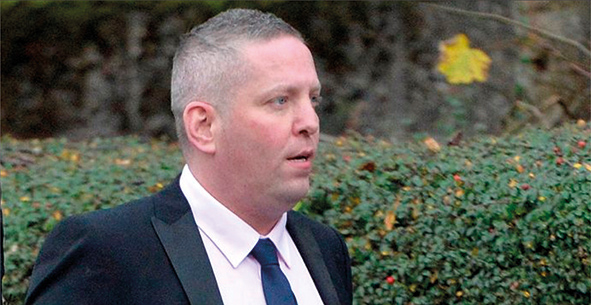
A Glasgow cabbie has been fined £450 after running over a woman who had collapsed on the road.
John Paul Borland, 42, hit Patricia McBride, in Toryglen, Glasgow, on the night of March 6, 2022.
The impact left Ms McBride with life-threatening injuries, including multiple fractures and internal bleeding. She was placed in a medically induced coma for six days.
Borland claimed he was distracted by a man waving at him and failed to see Ms McBride lying in the road.
Borland was found guilty at Glasgow Sheriff Court of careless driving having initially stood trial for dangerous driving.
He received his sentence on 9 December where in addition to the fine, he was disqualified from driving for six months.
Borland, now former private hire driver, has two previous road traffic convictions.
NORWICH CABBIE BANNED AFTER LAPSE IN CONCENTRATION CAUSES SERIOUS MOPED CRASH
A 61-year-old Norwich cabbie has been banned from driving after seriously injuring a moped rider in a crash, effectively ending his 40-year career. Anthony Gridlestone pleaded guilty at Norwich Magistrates' Court to causing serious injury by driving without due care and attention.
The court heard that on 28 March, Gridlestone failed to stop at a mini-roundabout on Drayton Road, colliding with a moped that was crossing. The impact threw the rider onto the bonnet of the taxi, resulting in fractures to his ankle and collarbone and requiring multiple surgeries.
Prosecutor Sally Harris stated that the crash occurred due to Gridlestone’s “unsafe manoeuver.”
Magistrates imposed a 12-month driving ban, fines and costs totalling £1,251.
David Foulkes mitigating acknow-ledged Gridlestone’s responsibility for the accident, attributing it to a “momentary lapse in concentration.”
He said: “There is no suggestion that he was impaired in any way. He was breath tested at the scene. He stopped at the scene and to give assistance to the rider.”
CABBIE LOSES JOB AFTER DRUG DRIVING IN POWYS WHILE CARRYING TWO PASSENGERS
A taxi driver has lost his licence after he was caught under the influence of cocaine while driving with two passengers in Newtown.
Sajjad Hussain, 44, told police he was unaware that traces of the Class A drug were still in his system after going on a night out a few days prior to being pulled over in his Toyota Prius on 22 May.
The cabbie pleaded guilty to two counts of drug driving when he appeared at Welshpool Magis-trates’ Court on 26 November.
A blood test at Aberystwyth Police Station found that he had more than 240 microgrammes of the Benzoylecgonine, a metabolite of cocaine, and more than 12 micro-grammes of cocaine. The legal limit for both drugs are 50 mcgms and 10 mcgms respectively.
Gurleen Kaur, who was acting on behalf of Hussain, said he was driving as a taxi driver at the time, but his driving was not impaired.
“He is remorseful and has entered early guilty pleas. I ask that the disqualification is put at the lower end of the range.”
The court heard that Hussain had a caution for possessing a Class A drug 10 years ago.
Magistrates disqualifed Hussain, from Dudley, for 17 months, and reduced the fine to £200 after taking into consideration his job loss. He must also pay £85 court costs and an £80 victim surcharge.
MAN WHO POSED AS BURY PRIVATE HIRE DRIVER GIVEN SUSPENDED SENTENCED
A man who falsely posed as a private hire driver in Bury has been handed a suspended sentence.
Faisal Hussain, 31, from Bolton, forged a PH driver’s licence to continue operating after his genuine licence had expired. The deception was uncovered by Bury Council licensing officers when a vehicle he was driving failed a routine inspection at a test centre.
Hussain pleaded guilty to offences under the Fraud Act and LGMPA 1976 at Stockport Magistrates’ Court on 11 September. At his sentencing hearing in November, Manchester and Salford Magistrates’ Court sentenced him to 16 weeks imprisonment, suspended for 12 months.
He was also ordered to complete 15 rehabilitation activity days, 100 hours of unpaid work, and pay £454 in costs and surcharges.
LIVERPOOL CABBIE JAILED FOR 58 MONTHS AFTER ADMITTING DEALING CLASS A DRUGS
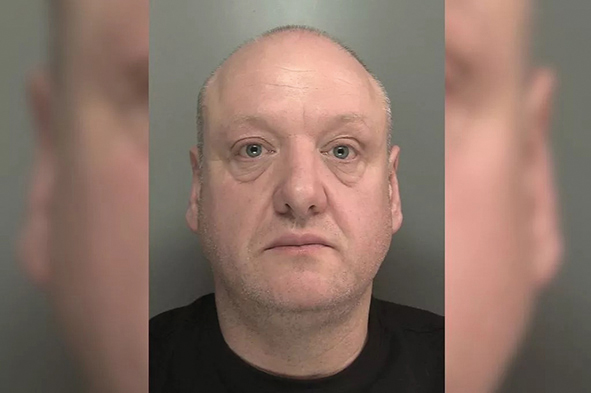
A taxi driver who ran a “one stop shop” drug dealing operation has been locked up for a second time this year and been jailed for four years and ten months.
Edward Marshman, 49, from Walton, was sentenced at Liverpool Crown Court on 4 December, after admitting possession of class A and B drugs with intent to supply.
The court heard that Marshman was caught behind the wheel on July 14 2023 while disqualified from driving. After his vehicle was seized, he went to collect items left inside.
But Kevin Liston, prosecuting, described how the police located a stash of drugs hidden within the centre console before Marshman was able to retrieve his possession.
This included around 11g of high purity cocaine, an ounce of ecstasy, 13.9g of ketamine, four tablets of the hallucinogenic class A drug 2CB, a bottle containing 50ml of class B substance GBL and 9.5g of cutting agent benzocaine.
The haul was said to have been worth more than £4,000. Marshman was then pulled over by officers on 19 August 2023, and arrested following a struggle. He was found in possession of 3.4g of cocaine and 15g of ketamine - valued at £980.
When his phone was analysed, it contained a string of flare messages advertising his illicit wares.
Marshman has 18 previous convictions for 46 offences, including a 58-week imprisonment for fraud imposed by the same court in April this year where he had used his position as a taxi driver to exploit a vulnerable customer.
Judge Ian Harris condemned Marshman’s actions, describing drug dealing as an “evil trade” that ruins lives. He noted that Marshman had shown a disregard for the law and decency, and sentenced him accordingly.
Judge Harris said. “Your actions have caused significant distress and financial loss.
“You say you were using cocaine to sustain an unhealthy working pattern while working as a taxi driver. You say you were pressured to take risks on behalf of criminals.
“You have shown a disregard for the law and standards of decency.”
PH DRIVER SPOTTED INHALING NITROUS OXIDE BY POLICE IN LIVERPOOL
A private hire driver was allegedly spotted “inhaling nitrous oxide” when they were stopped by Merseyside Police officers.
The force said the driver of a black Kia Niro had been stopped for speeding when police saw the driver inhaling nitrous oxide.
In a post on X, The Roads Policing Unit said: “This PHV was stopped for excess speed. When stopped, the driver was seen to be inhaling nitrous oxide. The driver provided a positive test for cannabis and cocaine and was arrested.”
When asked whether the council would be made aware, the account replied: “Their licence was suspended and a report to Sefton Council has been made.”
MANAGE ONLINE REVIEWS
START THE NEW YEAR STRONG: GOOGLE REVIEWS MATTER FOR TAXI FIRMS
As we enter 2025, it’s the perfect time to focus on growth, reputation and how to make your taxi firm stand out. Positive reviews are like gold for your business, helping you climb to the top of Google search results for phrases such as “Taxi near me.”
Positive reviews: your New Year’s resolution
In the digital age, reviews are the “new word of mouth.” A strong presence on Google is the modern equivalent of being “number one in the phone book.” Managing your reviews effectively can revolutionise your firm’s bookings, driver recruitment and account work in 2025.
Facing the challenge of negative reviews
The New Year is a great time to address challenges, and one common concern for taxi firms is negative reviews. Passengers are quick to complain when things go wrong, while those who enjoy their booking rarely think to leave positive feedback.
Buying fake ones might seem tempting, but these tactics can backfire - harming your reputation with both passengers and Google. Instead, start 2025 right by focusing on what really works: generating genuine, positive reviews that overshadow the negatives.
Make positive reviews your best asset
When your firm boasts hundreds or thousands of 5-star reviews, the occasional negative one fades into the background. A glowing reputation is the ultimate New Year’s gift to your business.
ReviewMaster: your partner for a successful 2025
That’s where ReviewMaster steps in. Seamlessly integrating with systems such as Autocab, iCabbi, Cab9 and Cordic, ReviewMaster works tirelessly to generate authentic, 5-star reviews - boosting your Google rankings and helping you dominate the local market.
With ReviewMaster, you can:
- • Generate glowing reviews that improve your visibility and reputation.
- • Increase bookings and attract more business accounts.
- • Strengthen your SEO and online trust 24/7, all year round.
Start 2025 with a FREE TRIAL!
Ready to take your firm to the next level? Use code PHTMJAN25 to claim your one-month FREE trial of ReviewMaster.
This New Year, turn satisfied customers into advocates and set your business up for success.
Call ReviewMaster today on - 0330 088 9330 www.review-master.co.uk
SOCIAL MEDIA SAVVY
TEN NEW YEAR’S MARKETING RESOLUTIONS FOR TAXI BUSINESSES IN 2025
Article by Phil Holloway
Hollogram Ltd www.hollogram.com
As the Marketing Director at Hollogram Ltd, I’ve spent years helping taxi businesses grow and thrive in an increasingly competitive market. The dawn of a new year offers the perfect opportunity to re-evaluate your marketing strategy and set goals to earn more money. Here are ten actionable marketing resolutions for taxi businesses in 2025:
1. Embrace local SEO
Invest in optimising your website for local searches. Ensure your business is listed on Google My Business and other local directories. Update your profile with accurate contact details, operating hours and high-quality images. Encourage satisfied customers to leave positive reviews, as they play a pivotal role in boosting your online visibility.
2. Optimise your app
If your business has an app, make it the best tool for your customers. Regular updates, user-friendly navigation, and exclusive app-only offers can increase downloads and usage. Highlight features like real-time tracking, fare estimates, and easy payment options to attract tech-savvy customers.
3. Leverage social media
Social media is no longer optional. Facebook, Instagram and TikTok are ideal for showcasing your services, engaging with customers, and running targeted ads. Post engaging content such as driver stories, customer testimonials, and promotional deals.
4. Invest in paid advertising
Utilise pay-per-click (PPC) advertising to target customers in your service area. Google Ads and Facebook Ads allow you to set location-specific campaigns, ensuring you reach the right audience. Monitor performance metrics to optimise your ROI.
5. Develop partnerships with local business
Collaborate with local restaurants, hotels and event organisers. Offering exclusive discounts or loyalty programmes can create a win-win situation for both parties, increasing your bookings while providing added value to your partners.
6. Launch a referral programme
Word-of-mouth is still one of the most effective marketing strategies. Encourage your existing customers to refer your services to friends and family by offering incentives such as discounts or free rides. Ensure the process is simple and rewarding.
7. Diversify your fleet
Sustainability is a growing priority for customers. Consider adding eco-friendly options like electric or hybrid vehicles to your fleet. Promoting your green initiatives can attract environmentally conscious riders.
8. Create engaging video content
Video content is king in 2025. Share behind-the-scenes footage, safety tips or short customer interviews. Platforms such as YouTube and TikTok can significantly expand your reach while humanising your brand.
9. Monitor industry trends
Stay informed about changes in the taxi and transportation industry. Whether it’s new regulations, payment technologies, or competitor strategies, staying ahead of trends will help you adapt quickly and maintain your competitive edge.
10. Prioritise customer feedback
Regularly gather customer feedback to identify areas for improvement. Conduct surveys or offer simple ways for customers to share their thoughts. Address-ing complaints promptly and implementing suggestions demonstrates your commitment to quality service.
Final thoughts....
The taxi business landscape continues to evolve, and staying proactive is essential for growth. These ten marketing resolutions can help your business attract new customers, retain loyal ones and ultimately increase your revenue. By using these strategies, your taxi company can attract new customers and recruit more drivers, creating a cycle of sustainable growth. For support with marketing your business, contact Phil Holloway at phil@hollogram.com or call 01509 398 002. Here’s to a prosperous 2025!
M2M SMART MESSAGING
SMS v WHATSAPP NOTIFICATIONS: WHICH IS MORE EFFECTIVE FOR TAXI DISPATCH COMMUNICATION?
Article by M2M Smart Messaging www.m2msmartmessaging.com
In today’s fast-paced world, effective communication is the lifeblood of any successful taxi dispatch operation. As technology continues to evolve, so do the tools we use to connect drivers and passengers.
With SMS and WhatsApp standing out as two powerful contenders, the question arises: which platform reigns supreme in enhancing taxi dispatch communication?
While SMS offers reliability and universal accessibility, WhatsApp brings a raft of features that can transform the way we engage.
Imagine a system where every notification is instantly received, every query is swiftly answered, and all communication is streamlined for maximum efficiency. The right choice can not only elevate customer satisfaction but also empower drivers, making their jobs easier and more productive.
Join us as we delve into the strengths and weaknesses of SMS and WhatsApp notifications, and discover which option will drive your taxi dispatch service to new heights!
How do SMS and WhatsApp compare in terms of usage?
SMS (Short Message Service) and WhatsApp are both popular messaging platforms, but they differ significantly in terms of usage, features, and technology.
SMS is a built-in feature on virtually all mobile phones, meaning it can be used without an internet connection. Users can send and receive texts as long as they have cellular service. WhatsApp requires an internet connection (Wi-Fi or mobile data) to function. Users must download the app and set up an account linked to their phone number.
Cost: Sending SMS messages can incur charges depending on the user’s mobile plan. Some plans include unlimited texting, while others may charge per message. WhatsApp is free to use for the passenger, although they may incur data charges if they are not connected to Wi-Fi.
Features: SMS is primarily limited to text messages, with a character limit (typically 160 characters). While some carriers support multimedia messages (MMS), this often comes with additional charges. WhatsApp is feature-rich, allowing users to send text messages, voice messages, images, videos and documents. It also supports group chats, video calls and voice calls, making it more versatile.
Security: SMS messages are generally not encrypted, making them more vulnerable to interception. While some carriers offer enhanced security features, SMS remains less secure than many internet-based messaging apps. WhatsApp offers end-to-end encryption, meaning that messages can only be read by the sender and the recipient. This provides a higher level of privacy and security for users.
User Demographics: SMS is widely used across all demographics, including those who may not have access to smartphones or the internet. It remains a reliable communication method for many people. WhatsApp tends to be more popular among younger users and those in urban areas with better internet access. It has a significant user base in regions such as UK, Europe, Latin America and parts of Asia.
International Communication: Sending texts internationally via SMS can be expensive, as charges may apply based on the recipient’s location. WhatsApp allows users to communicate internationally for free, provided they have an internet connection, making it a go-to app for global messaging.
In summary, while SMS remains a reliable and universally accessible method of communication, WhatsApp offers a richer set of features, enhanced security and cost-effective international messaging, appealing to users who seek more than just basic text messaging.
Book a demo: https://m2msmartmessaging.com
TERROR TIMES
MAN ARRESTED OVER BIRMINGHAM ATTACK ON PRIVATE HIRE DRIVER IN HIS 80s
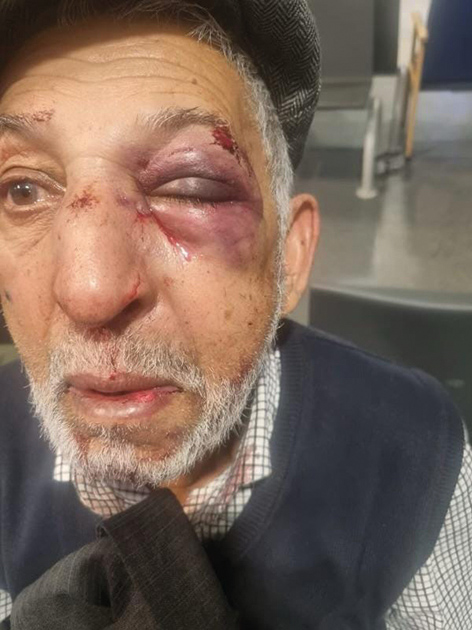
A man has been arrested after footage went viral showing an elderly private hire driver with a bloodied face.
A graphic photo circulated on social media showed the victim’s badly bruised eye, split eyebrow and lip, cut nose, as well as a blood-soaked collar.
Bawa Hukamdad was attacked on Kings Heath High Street, around 4.15pm on Saturday, November 23, but video and pictures emerged a week later, sparking horror.
West Midlands Police released a statement which said: “We’ve arrested a man on suspicion of assaulting a taxi driver on Kings Heath High Street. “We’ve been investigating after a man in his 80s sustained nasty facial injuries at around 4.15pm on 23 November.
“Following enquiries, we detained a 37-year-old man on suspicion of assault yesterday (Sunday). He has been released on police bail with strict conditions as enquiries continue.”
There has been widespread revulsion after footage taken from the inside of a car parked behind the private hire vehicle at the time, went viral.
The police statement continued: “The investigation is ongoing and anyone with information is asked to contact us via Live Chat, or by calling 101, and quote 20/978519/24.”
ABERDEEN CABBIE ASSAULTED ON CHRISTMAS DAY HAS FINGER BITTEN TO THE BONE
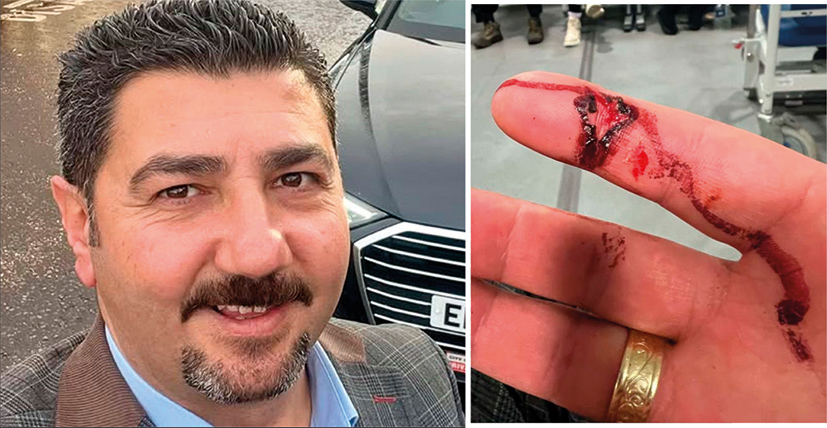
An Aberdeen taxi driver spent Christmas Day in A&E after a passenger viciously attacked him, biting his finger “to the bone.”
Abdullah ER, a self-employed driver for Rainbow City Taxis, picked up a fare in the Riverside of Blairs area on Wednesday evening. The passenger, a young man had his face covered throughout the journey to the city centre.
Upon arrival at Bon Accord Street at 8:12pm, the passenger attempted to pay the £23.80 fare with a purple card by phone, then left the car without waiting for confirmation.
Mr ER recounted. “When I called him back, he ignored me and walked away.”
Mr ER caught up with the passenger to inform him of the declined payment, at which point the passenger launched an unprovoked attack.
“He started punching me, and when I tried to defend myself, he bit my right index finger very deeply,” Mr. ER said.
“I shouted at him to stop, and he eventually released his grip, then fled the scene.”
The cabbie sustained a severe bite wound to his finger, requiring immediate medical attention. He spent several hours in the emergency room receiving treatment for the injury and receiving Hepatitis B injections as a precautionary measure.
He is now on a six-month treatment course and a week of antibiotics.
Police Scotland has confirmed that an investigation into the incident is ongoing.
VIOLENT ATTACK BY PASSENGER ON PH DRIVER IN MANCHESTER

A private hire driver has been violently attacked in Manchester. He had picked up a passenger from an address in Moston, he then picked up two females and drove them around for about an hour.
However when he asked for the fare, the driver said he suddenly felt something hit him in his eye. He felt pain, could not see and fell to the floor.
He immediately called the police and waited for half an hour but they did not arrive! He then called his friends who rescued him and took him to hospital.
The driver has now been referred to North Manchester General hospital as the injury to his eye sight is of a serious nature.
It is hoped that the police will see this as a priority and take swift action to arrest the culprit.
TEENAGE THUG LEAVES CUMBERNAULD CABBIE BRAIN DAMAGED IN BRUTAL ATTACK
A teenager, who was 16 at the time of the attack, has pleaded guilty to attempted murder at the High Court in Glasgow on December 12.
The thug, who cannot be named for legal reasons, launched the unprovoked assault on 55-year-old David Walker on July 13, 2023, leaving the victim brain-damaged.
Mr Walker, a driver for Central Cars, had picked up a man, who did not pay the fare and fled to a house in Kilsyth, North Lanarkshire. The teenager then came out onto the street and confronted Mr Walker.
Prosecutor Anna Chisholm said: “He was being encouraged by other males in the house who were shouting and asking him to make a recording.”
A row then broke out between pair. The teenager yelled at the cabbie: “I am taking your taxi for a drive. Do not f***ing grab me.” He then repeatedly punched Mr Walker, who tried to block the blows.
Miss Chisholm said: “Mr Walker momentarily fell to the ground and the accused repeatedly stamped on his head and kicked him as he tried to stand up.”
CCTV of the attack - which was partially obscured by trees - was played at the hearing. As he sat in the dock, the assailant initially covered his eyes with his hand to stop him watching the footage.
Mr Walker was dragged across the road as the thug threatened to stab him. He tried to escape to his taxi, but was followed and ended up on the ground bleeding and the thug booted him another two or three times.
Miss Chisholm: “Other males repeatedly warned him that he had killed Mr Walker. On one occasion, he replied: ‘Good’.”
The taxi firm controller could hear what was happening via Mr Walker’s radio and called for help. A fellow driver turned up and found the victim lying unconscious.
Mercy crews arrived at the scene - the attacker lied that he had been stabbed.
Mr Walker was rushed to hospital - he was suffering from a traumatic brain injury, broken nose and larynx as well as a dislocated shoulder.
Miss Chisholm: “For the first 24 hours, doctors were concerned that he may succumb to his injuries.”
Mr Walker received intensive treatment before finally being able to leave hospital on 6 October 2023.
He requires “ongoing specialist input” including from an occupational therapist, physiotherapist and clinical psychologist. He has also been unable to work.
He will be sentenced in the new year.
Lord Armstrong, who presided over the case, described the attack as “one of the most grave charges” and ordered a social work report to inform sentencing.
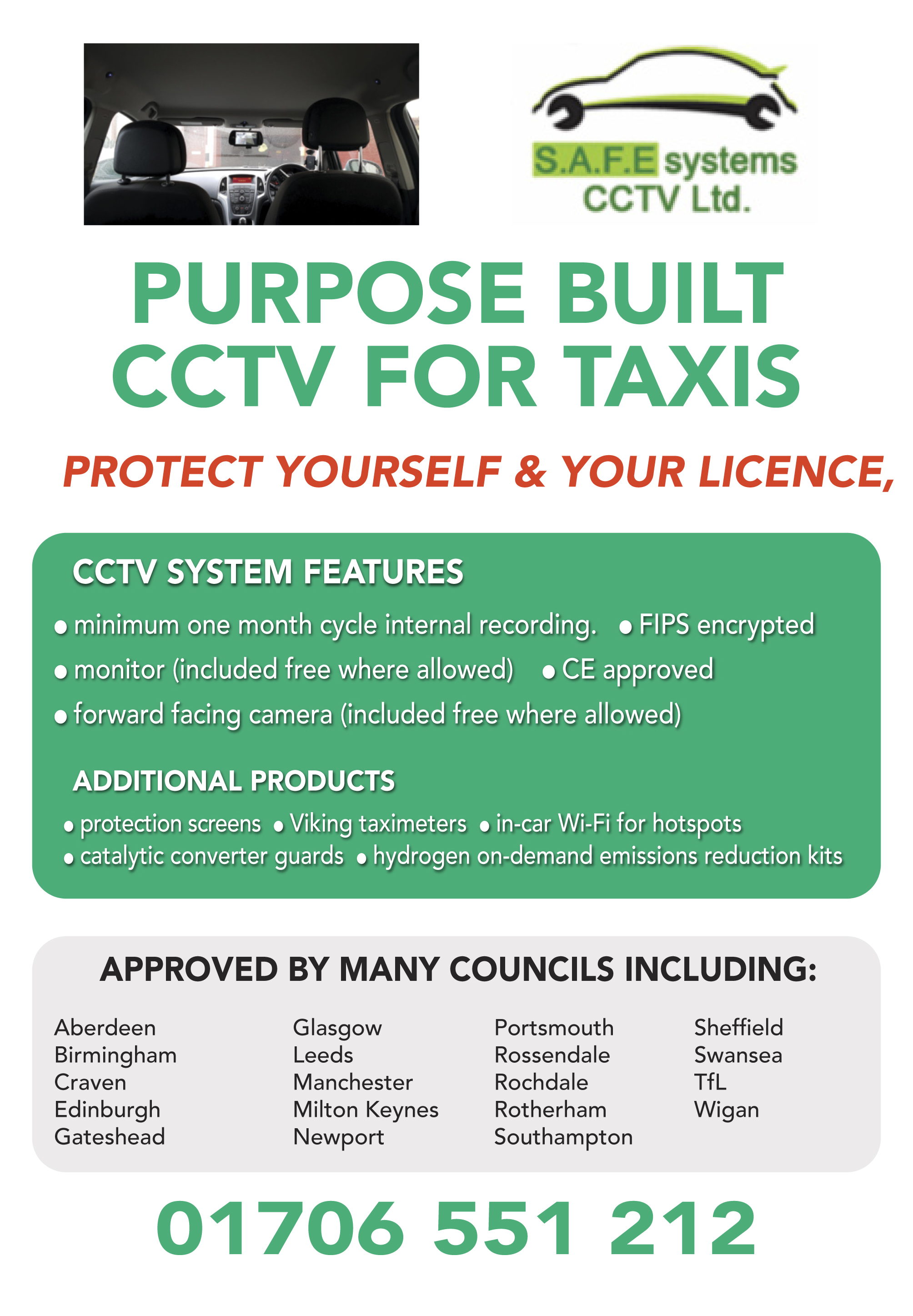

BRIGHTON CAB TRADE VIEW
A NEW YEAR WITH NEW BEGINNINGS, OR MUCH OF THE SAME? OR COULD IT BE EVEN WORSE?
By Andy Peters, BHCTA www.bhcta.co.uk
In December it was announced, as per the PHTM report, that the government is issuing a White Paper called the ‘English Devolution White Paper’ which includes a major shakeup of the taxi/PH industry. In fact there is actually only a small section that refers to taxis and private hire licensing in the document.
To fully understand what devolution means is explained in two paragraphs: “This White Paper sets out how we will achieve this, backed up by our landmark English Devolution Bill, which will empower communities to take back control from Westminster. Taking back control - if it means control for communities, not politicians in Westminster - is absolutely essential for growth." And “We will give Mayors strong new powers over housing, planning, transport ,energy, skills, employment support and more, backed up with integrated and consolidated funding."
The document itself has 89 pages and I suspect the one small section that refers to the taxi/PH trade was just slotted in at the last moment. But even so, this causes me, and should cause you, great concern where its states: “Larger footprint..." and “Greater economies of scale.."
“Taxi and private hire vehicles
Taxis and PHVs are an important part of our transport networks and some of the most vulnerable groups in our society rely on them. We recognise there are concerns about out-of-area working by PHVs and are exploring how best to address these concerns. As part of this, we will consult on whether to make all Local Transport Authorities (including Strategic Authorities) responsible for taxi and PHV licensing.
Administering taxi and PHV licensing across this larger footprint would increase the consistency of standards and enable more effective use of enforcement powers across a whole functional economic area. Greater economies of scale should also enable authorities to improve the efficiency of licensing, reducing the incentives for people to license out of their usual working area. This would be a significant change for the sector, and we will work with stakeholders to understand possible impacts before taking a final decision. In London, taxi and PHV licensing is already the responsibility of the Mayor and TfL.”
I fully admit that I am a great sceptic which I have evolved into after so many years of being in the trade. However, in a nutshell my interpretation is that to combat the ludicrous situation of POAW (Predominant Out of Area Working) or what I consider wrongly referred to a cross-border hiring, the apparent remedy is to make licensing areas bigger as referred to as “Larger footprint..”. And “Greater economies of scale..” to me means combining local councils. I may be wrong as there are no real details, but that’s my initial impression.
Effectively, and very worrying, this to me is adopting the same method by which Uber created the ‘Mythical Uber Regions’ to appease local councillors a few years ago which was a complete and utter farce. At that time I stated that this was Uber’s attempt at rewriting legislation to suit its own operational needs.... and blow me down. for all intents and purposes it looks like the government has been persuaded to look at doing that. We all know what influence a certain a multi-billion dollar global domineering company has. Although judging by the last government I suspect nothing has changed with this new lot either.
Hopefully I’m wrong in my interpretation, but instead of ‘keeping it local’ and keeping it so incredibly simple by allowing councils to apply an ‘Intended Use Policy’ to PHVs in the same way as hackney carriages; there seems to be a far more complicated resolution being drawn up behind closed doors. We know that natural cross-border hiring has to be in place, but the remedy to the current ‘Wolveritus’ issue, as it seems, is to have much bigger areas. I know, you couldn’t make it up!
Andy Burnham, Mayor of Greater Manchester has already hailed the new mayoral powers as a “big step forward” towards banning Wolverhampton PHVs from predominantly operating in Greater Manchester. tinyurl.com/ab18122024 However, I am really intrigued as to why he considers this to be the case? What was there in that tiny section in the White Paper that even hinted at that. So, I have emailed him to ask as to why he has interpreted it that way?
Locally
There was a recent public and trade survey on WAVs with various questions being put forward on the WAV service in the city. We have had a ‘Managed Growth’ policy for hackney carriages numbers which has been to issue five new plates per year on the provision that these are restricted to being assigned to WAVs. This means we have unrestricted hackney plates where a saloon or estate can be used and restricted plates were only WAVs can be used. We have around 600 hackneys in the city - the balance of WAVs/saloons is around 50/50.
There has also been a WAV condition of licence for operators, which has been in place since 2015, which was implemented just before Uber landed here. The condition stated any operator with a fleet of 100 cars must have 20% WAV compliant vehicles.
This has worked very well, and the three bigger local fleets had no issue in complying with this. At the special Licensing Panel Meeting in 2018, where the charismatic Uber barrister, Philip Kolvin KC, was pleading for the council to issue an operator licence he made the statement that Uber would have even more than the required 20% if granted the licence. It was actually refused but Uber won in court.
Having gained its operator licence, Uber then found itself having to comply with the 20% requirement and having to pay out a subsidy to drivers to have WAVs on its Brighton & Hove fleet. This also meant that it never exceeded the 100-car fleet. Mind you... it had brought in hundreds of Oots to predominantly work here.
Nevertheless, earlier this year the Uber rep, who attends the local Trade Forum meetings (who rarely if ever contributes to it) questioned the need for the continuance of keeping the 20% WAV requirement. I was very blunt about reminding him and everyone else of Mr Kolvin’s pledge on exceeding the 20% WAV requirement.
The outcome of that meeting was a public and trade survey on WAVs in the city. which is too long and complicated to go into here, but both of which were flawed in my opinion and I provided details on this. However, this resulted in a proposal from licensing to drop the 20% WAV requirement for operators. There were other points raised by the trade in general about the cost of WAVs. My great concern is that if that proposal is passed by the Licensing Committee, then Uber will wash its hands of the responsibility that local companies have undertaken for years and well before Uber appeared here. Importantly, Uber does not provide a customer phone number and it only functions via an app. Whereas local companies not only work via a customer app but also by phone. In just providing an app, Uber can ignore undertaking disabled accessibility tailored to meet each individual’s requirements.
So, on this basis I have put forward a replacement condition: ‘‘To safeguard that disabled passengers in wheelchairs receive an equal service, any operator operating 100 or more vehicles must ensure the provision of a wheelchair accessible service to be considered ‘Fit and Proper’ to hold a Brighton & Hove operator licence.”
This does not state a specific number of WAVs to be in place, but ensures that Uber must still provide WAVs and that the provision of WAVs in the city does not just fall on the responsibility of the local companies.
Wolverhampton advance vehicle licensing
Earlier in December there was a photo being shared on the trade social media that showed a Wolverhampton PHV licence plate and certificate displaying the starting date of the licence as being 14 January 2025. Whilst it is appreciated that licensing departments may not be able to carrying out a relicensing exactly on the date of the expiry date of the old one, I question the legitimacy of granting such a licence in excess of a month in advance.
So, being the busy-body that I am I contacted Wolverhampton licensing about this. The reply came back stating the vehicle in question was inspected on December 9 and the licence granted and “.... it isn't feasible to inspect every vehicle on its exact expiry date." OK... but in excess of a month in advance?
It could be the case that your council does the same, but I wrote back to Wolverhampton licensing putting to them that this practice is probably down to the fact that it has issued in excess of 29,000 vehicle licences, which works out having to license around 116 vehicles a day on a five-day week, 50 weeks a year.
To date there has not been a reply. However, on the basis that the DfT likes to issue Best Practice Guidance for the taxi and private hire trade, I have written seeking its view on councils issuing vehicle licences in advance and in excess of month of the expiry of its current one.
Anyway, onwards and upwards... and may we all get what we deserve in 2025!
ALL THINGS LICENSING
By Mike Smith IoL and Guildford Borough Council
The Devolution Revolution
Firstly, a Happy New Year to members of the trade. If you were like me and wished that Santa would bring you some glimmer of hope of good news to do with taxi and private hire reforms then just before Christmas the announcement of the Devolution White Paper may have tantalised the beginnings of an answer.
The Devolution White Paper applies to England only and outlines the Government’s plans to transfer more powers and funding from central Government to local authorities across England. This is seen as important because it ensures that decisions are made closer to the local people, communities and businesses they affect.
The White Paper sets out that the Government expects councils in all 21 two-tier areas (areas where there is both a county and district/borough council undertaking different tasks) to reorganise over this Parliament and the next. The Government intends reorganisation to happen in a phased approach, with the first new unitary councils expected before the end of this Parliament.
Ultimately, the aim of the White Paper is to ensure councils collaborate in the form of larger strategic authorities, in some areas governed by directly elected Mayors (although with the ambition that all areas will ultimately have an elected Mayor), to develop growth plans tailored to their regions, focusing on economic development, housing, transport and skills.
So, what does this mean for the taxi/PH trade?
The White Paper includes reforms to local transport and sets out potentially significant reforms to taxi and private hire vehicle (PHV) licensing as part of the broader strategy to reform the services provided by local authorities enabling them to deliver strategic benefits to their regions.
Rather than being tucked away, section 3.3 of the White Paper referencing Transport and Local Infrastructure specifically states:
“Taxis and private hire vehicles are an important part of our transport networks and some of the most vulnerable groups in our society rely on them. We recognise there are concerns about out-of-area working by private hire vehicles and are exploring how best to address these concerns. As part of this, we will consult on whether to make all Local Transport Authorities (including Strategic Authorities) responsible for taxi and private hire vehicle licensing.
“Administering taxi and private hire vehicle licensing across this larger footprint would increase the consistency of standards and enable more effective use of enforcement powers across a whole functional economic area. Greater economies of scale should also enable authorities to improve the efficiency of licensing, reducing the incentives for people to license out of their usual working area. This would be a significant change for the sector, and we will work with stakeholders to understand possible impacts before taking a final decision. In London, taxi and private hire vehicle licensing is already the responsibility of the Mayor and Transport for London.”
Essentially this is a revival of the previous Government’s proposals for taxi and private hire vehicle licensing to be removed from district councils in two-tier areas and reallocated to Local Transport Authorities.
There are many benefits to larger conurbations delivering licensing functions. In the absence of a national standard, the proposals aim to create a more consistent, efficient and enforceable frame-work for the sector by:
- • Standardised licensing across a geographical region administered by a single authority will reduce inconsistency between areas.
- • Improved enforcement as larger authorities should have greater capacity to ensure new local standards are adhered to, although it will also be interesting to see how the specifically referenced challenges related to crossborder working are addressed as many areas have an influx of drivers and vehicles which are licensed some consider-able distance away, which will not be resolved by larger local authorities.
- • Achieving economies of scale through improved efficiency through centralising operations and reducing administrative costs.
Clearly the hope is that there will be less incentive for operators to seek licences in areas far away from where they intend to work, thus reducing the long standing out of area working issue. However, in the White Paper the Government specifically notes the sector’s complexity and the potential impact of these changes, advising that it will consult with stakeholders; including operators, local authorities, and passenger groups to ensure it fully understand the concerns of those involved and implications before making a final decision.
However, as positive and as much needed as this sounds, the sceptic in me will only believe it when I see it, as we have been in this position before. These changes very much depend on collaboration between councils to form a larger administrative authority and echo the previous Levelling Up plans to continue to administer the same laws which were fraught with the difficulties of trying to make out of date laws work, albeit on a bigger scale. Let us also not forget that the Law Commission Report from ten years ago has never been responded to, which only attests to the com-plexities of the sector and adds to the cynicism of many that this task is likely to be moved into the ‘too difficult’ pile when consultation starts and different groups have their say.
Nevertheless, if the Devolution White Paper does make its way into law, there is likely to be a revolution for the licensed sector which would bring it into line it with the Government’s wider goals for local devolution and regional accountability.
What about a National Transport Strategy?
Just a few days before publication of the White Paper, the Government released a consultation calling for ideas for an integrated National Transport Strategy. Whilst the White Paper recognises the essential role that taxis and private hire vehicles play in local transport networks, particularly for vulnerable groups who rely heavily on their services, and echoes the Best Practice position that ensuring the services are safe, efficient, and properly regulated; unfortunately, there is no mention of the licensed sector whatsoever in this consultation.
This is at best confusing and disappointing considering the emphasis in the White Paper about improving transport regionally and the important role the licensed trade deliver, adding weight to the view that the Government is unsure how best to manage the licensed sector and my worry that all this New Year optimism and hype will not bring about much needed improvement.
Therefore, I would encourage licence holders to view the consultation and emphasise the important role the licensed trade play in transporting members of the public.
The consultation is available at:
Tax Conditionality
Furthermore, it is clear that the relatively new Government has a large number of ideas. The Budget in late October committed to exploring the way in which the licensing system could be used to expand tax conditionality to other sectors in order to reduce the tax gap from the ‘hidden economy’.
Driver and operator applicants will know that the existing tax conditionality requirements which affect the licensed trade mandate the licensing authority to check that the applicant has registered for their tax responsibilities before an application can be accepted.
Currently this check only applies to driver and operator licence holders and there is a current consultation looking to introduce this requirement specifically to vehicle proprietor applications, together with ‘ideas on a postcard’ about the many other different licence types which could fall into scope.
The consultation is available at:
https://shorturl.at/a17WaCan you help keep your young passengers safe?
Finally, on a different but very important note, The Children’s Society, working with the Metropolitan Police together with Transport for London licensing department, have produced the following resource which highlights important safeguarding signs to look for and what to do if you have any concerns.
Across the country, children are being manipulated, sexually abused, forced to launder money and deal drugs. Exploitation isn’t obvious. But it can happen anywhere, to any child and it is established that criminals use taxis and private hire vehicles to pick up and drop off children for these purposes.
In order to stop it, you can help. As a driver, you are in a unique position to spot the signs and help get that child into a place of safety.
We know that many licensing authorities require Safeguarding training however the following web resource and video have been produced by The Children’s Society to help raise awareness and act as an important refresher:
https://mailchi.mp/childrenssociety/lookcloser-for-drivers-of-taxi-phv
Please spend a few minutes of your time refreshing yourself on this important topic.
The start of a year of change
Clearly the Government intends there to be radical reform of local authorities which will have significant impact on the licensed trade, although at the same time deliver much needed improvement to some of the problems and difficulties which affect this important transport sector.
So, if your New Year’s resolution is to ensure you keep on top of licensing updates and matters affecting the trade then I would again encourage members of the trade to join the Institute of Licensing.
For full details, please visit:
www.instituteoflicensing.org
KNOW YOUR RIGHTS
We hope you all had an enjoyable holiday and are looking forward to the year ahead.
The weeks after Christmas are an interesting time for us at Patterson Law, as we often get asked questions from people who have been involved in work party incidents or stopped for drink driving having had one too many on Christmas Day. However, we also get asked a lot of questions about shiny new toys and gadgets people have been given as presents, and we thought we would share some of those with you to help you keep safe and on the right side of the law. These are all based on real questions that we have received from drivers over the past few years in the days and weeks after Christmas.
Please don’t forget, if you’ve been given any presents for your car and you’re worried about how it could affect you, don’t hesitate to get in touch. You can call us on 01626 359800 or e-mail us at enquiries@pattersonlaw.co.uk for free advice.
I bought my son an electric scooter for Christmas, is he legally allowed to ride it?
It’s very unlikely he is going to be able to ride it in any public place. Electric scooters are considered ‘motor vehicles’ under the Road Traffic Act and therefore need to have licence plates, insurance, passed various safety tests and he would need a licence to ride it.
If he rides the scooter on a road or other public place, he is risking being prosecuted by the police and the scooter would almost certainly be seized. He could end up with penalty points, fines and even being disqualified from driving.
My wife bought me a breathalyser kit as a Christmas present, how accurate are they?
It depends on the manufacturer, but our advice is never to rely on them as being spot on and accurate. It’s very difficult to tell exactly how much alcohol someone is going to have in their system as it depends on what they had to drink, how quickly they drank it, what they have eaten, whether they have taken any medication, their height, their weight and their sex, amongst other things.
Homemade home breathalyser kits can be useful but just be wary that it’s no defence in law to drink driving that your home breathalyser kit said you were under the limit. Our advice is that it’s always better safe than sorry and if you are going to drive, then do not drink.
Have been given a dash cam, if I record somebody and report it to the police, does that mean I might end up having to attend court? Also, can the police seize my dash cam and use it against me?
Yes, and yes. If you submit dash cam footage you are effectively a witness to a crime. A lot of the time when footage is submitted the matter is resolved outside of court by way of fines and penalty points. However if the person you have reported is disputing committing an offence, then the matter may end up at a Magistrates’ Court and you may be required to attend court as the key witness.
Likewise, if you are ever being investigated for an offence, the police can, and in many cases do, seize your dash cam to have a look at your driving, not just on the day of an alleged offence but your historical driving behaviour as well. And that may well be used against you.
However, don’t forget that dash cam evidence can be very useful. We’ve used dash cam evidence from our clients on many occasions to exonerate them of an offence and to prove they’ve done nothing wrong when they’ve been wrongly accused.
I got myself a new phone cradle, is it illegal to use a phone even if it’s in a cradle?
It’s only an offence to use a handheld mobile telephone whilst driving. So if it’s not held in your hand then you are not committing an offence. Just make sure it is always in the cradle because even if you pick it up for a split second whilst the screen is illuminated you could end up with six points.
Word of warning, though, just because the phone is in a cradle it doesn’t mean you have free range to use it. If you are watching videos or are completely distracted by the phone, they could accuse you of not being in full control of the car which carries three points, or worse if using the phone causes a drop in the standard of driving. You could be prosecuted for driving without due attention, which carries up to nine points or a disqualification.
My mum and dad bought me a scooter for Christmas but told me to get it insured. I was thinking of putting them down as the main drivers and me as a named driver as it’s cheaper. What’s the worst that can happen?
Our advice is always to be open and honest with the insurance company. This is not something we would recommend doing unless your parents are going to be the main drivers of the scooter.
If you are pulled over by the police, they might try to seize the scooter and suggest the insurance is invalid, but that is unlikely to hold up in a Magistrates’ Court and you’re unlikely to receive any penalty points.
The big risk though is if you had a crash. If the insurance company found out that they were not the main drivers and you had only done it to get a cheaper premium, they might refuse to pay out and you could be personally liable for any damages claimed against you. Worse still, they could accuse you of committing insurance fraud and you could end up in prison.
My boyfriend got me a window sticker for my car windscreen but it’s obscuring my view. Is that illegal?
If the sticker obstructs your view of the traffic ahead, then yes, this is illegal.
It is an offence if you ‘do not have full control of your vehicle or have a full view of the traffic ahead’. It is an offence which carries three points and a £100 fine.
So if you are going to put any stickers on your car, make sure they are well out of your line of sight. As long as they don’t obstruct your view of the traffic ahead or either of the side windows/mirrors, you should be fine.
My mate bought me a radar jammer for Christmas as a joke present. I assume I can’t actually fit it to my car?
No, absolutely not. Radar jammers are used to block speed cameras, so they can’t record your speed. The police consider this ‘perverting the course of justice’.
There have been cases recently where the police have prosecuted people for perverting for fitting jammers, and most of the time they get sent to prison.
I got a new spoiler and alloys for the car for Christmas and my mate says he can fit it but I’m worried. What happens if he doesn’t fit it properly?
Take it to a mechanic and get it fitted professionally. If it’s fitted properly and you inform your insurance company, there should be nothing to worry about.
If your mate fits it incorrectly, you could be charged with driving a vehicle in a dangerous condition, which carries three points and a £100 fine. If the spoiler/alloys are so badly fitted that it could be considered a real danger to other road users, you could even be prosecuted for dangerous driving which carries a minimum 12-month disqualification, community order and in serious cases, prison.
For updates on road traffic law follow us on facebook.com/PattersonLawMotoringSolicitors or twitter.com/Patterson_law_
WORLDWIDE TAXI FOCUS
from USA
SEVEN INJURED AFTER TAXI CRASHES INTO PEDESTRIANS IN NEW YORK
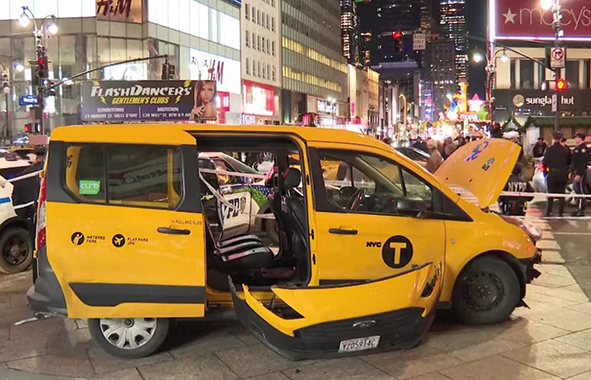
Seven people have been injured, including a child, when a taxi crashed into pedestrians on a pavement in New York City on Christmas Day.
The accident happened next to the iconic Macy’s department store in Midtown Manhattan just after 4pm.
It was reported that the 58-year-old driver lost control of his cab after suffering a medical emergency.
A nine-year-old boy suffered a cut and a 41-year-old woman sustained an injury to her head, police said. Both were taken to hospital. Two women and three others were also injured. One of the women suffered an injury to her leg and was also taken to the hospital.
A passer-by visiting from Oregon helped free the boy and his mother after they became trapped under-neath the taxi. The tourist said: “I ran over and noticed there was a little boy, his leg was underneath the front passenger tyre as it was spinning.
One man got into the vehicle shut the engine off. There was a whole group of us that ripped the bumper off, lifted the car back and then that’s when I grabbed the little boy, got him to the corner, realised that what ended up being his mum was underneath.”
from France
CABBIES PROTESTING OVER PATIENT TRANSPORT PARALYSE PARIS
Thousands of cabbies descended on Paris on 3 December, effectively bringing the French capital to a standstill. There were major disruptions on the roads, with the city essentially “paralysed”, especially on the A1 motorway.
More than 2,000 taxis gathered near the National Assembly (7th arrondissement), where some had been parked since 8am. Some cabbies waved flares, there were flaming barricades and riot police gathered in the city centre.
Taxi drivers are furious at changes in the healthcare transport system introduced in the 2024 Social Security budget. These require cabbies to offer car-sharing for medical patient transport, where multiple patients may need to be transported simultaneously.
Drivers argue that this reform, part of cost-saving measures by the French National Health Insurance Fund, will force them to provide additional discounts, which they claim will make their services unsustainable financially.
Recent demonstrations have included rolling blockades and slow-traffic operations in Paris and other cities, such as Marseille, Bordeaux and Lyon, significantly disrupting major routes.
Taxi drivers want “the abandonment of measures threatening the taxi transport of patients”.
According to the Team Taxi association, they also want to “combat illegal competition from VTC platforms” (meaning transport cars with drivers or driver-driven cars, such as Uber, Bolt...) and “finally promote taxis as an essential public service.”
from Ireland
GARDAI SWOOP ON CABBIE WATCHING VIDEO WHILE DRIVING IN DUBLIN
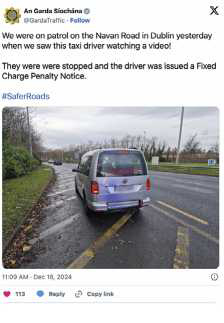
Gardaí who were on patrol in Cabra Co. Dublin spotted a taxi driver watching a video on his mobile phone while driving.
The driver was pulled on the Navan Road and was issued a Fixed Charge Penalty Point notice by An Garda Si'ochana.
from Germany
TAXI VOUCHERS TO HELP COLOGNE WOMEN GET HOME SAFELY AT NIGHT
The German city of Cologne is offering night taxi vouchers to women to help them get home safely, in a pilot project inspired by similar initiatives in other parts of Germany.
The Women's Night Taxi scheme is providing a total of 1,500 vouchers worth €10 each to women and gender-diverse people for taxi journeys between the hours of 10 pm and 6 am, according to Cologne’s city council. The vouchers can only be used with one company, Taxi Ruf, and the project will run until August 2025.
The city of Munich has been offering such night taxi coupons to women since 2020, and this year, the subsidy increased from €5 to €10 due to growing demand. Since then, other cities such as Stuttgart, Mannheim and Giessen have adopted the model.
While these schemes have been praised by many German news outlets and social media users, some people have questioned the relatively low value of the vouchers given that night-time taxis in major cities tend to cost far more than €10.
Similar apps and services promoting women’s safety have been launched in recent years in Germany, including a hotline staffed by volunteers who talk to callers during their journeys and take their information to pass on to police in case of an emergency.
More than two-thirds of German women are afraid to take public transport when it gets dark, according to a 2020 public survey conducted for the country’s BKA federal police.
And research that same year by NGO Plan International - based on a survey of 1,000 female residents of Hamburg, Berlin, Cologne and Munich -found that a quarter of women had experienced sexual harassment and a fifth had been followed, insulted or threatened while moving around their cities.
Cologne is currently preparing for its New Year festivities, nine years after hundreds of women were attacked and sexually assaulted during celebrations near the city’s cathedral. At least 600 women filed complaints to police ranging from sexual molestation to theft in the aftermath of the New Year celebrations in the city on 31 December 2015.
from Argentina
TAXI DRIVER FALLS ASLEEP AT TRAFFIC LIGHT IN BUENOS AIRES
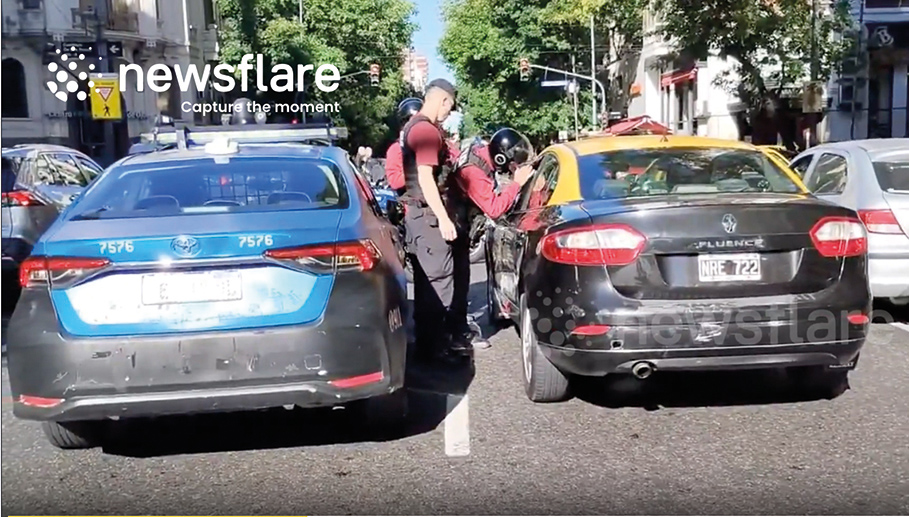
On December 16, 2024, in Buenos Aires, Argentina, @hector_motocam shared a video of a taxi stopped at a green light, where the driver was unresponsive.
According to the caption, police attempted to wake the driver without success, prompting firefighters to intervene. It was later confirmed that the driver had fallen asleep due to his blood alcohol level
from Philippines
TAXI HITS BARRIER AND FLIPS ON AFTER DRIVER FALLS ASLEEP
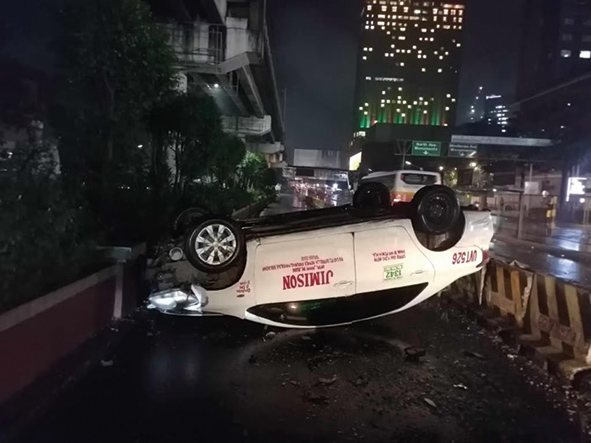
And finally a reminder for you all: DON’T DRIVE TIRED!
A taxi turned upside down after hitting a barrier along a northbound flyover on Edsa in Quezon City, near Manila early on the morning of 3 December.
The Metropolitan Manila Development Authority said in a report that the crash occurred around 4:55am at Edsa-Quezon Avenue’s north-bound flyover because the taxi driver fell asleep while driving.
Traffic was “slow-moving” along the lane where the accident happened, according to the MMDA.
BERNIE THE BOOK
PRANCING HORSE TO STAMP ITS HOOVES WITH LEWIS IN THE SADDLE
And happy new year!! I’m sure this isn’t the only column you’ve read recently that’s offered this salutation, but in my case its offered glibly and with no thought and its presumably being read equally glibly and read only to see who I am backing in 2025!!. After all its only about profit and so to events starting in January
SIX NATIONS
Firstly, an absolute steal of a wager, IRELAND to win the Six Nations, starting at the end of the month. Not only is Ireland the best team in the Northern Hemisphere and practically the world, but the fixtures this year see them at home to both France and England! - the only two teams that can possibly (on a good day...if Ireland didn’t turn up...and the ref was bent!) challenge. Take the universal 13/8 for the Championship now..15/8 with Hills if you hurry and maybe the Burlington Bertie (hundred to thirty) for Grand Slam glory
FORMULA ONE
What a season we’ve just witnessed with the petulant but extremely talented Max V actually being challenged hard by Norris, Russell and Le Clerc to the title. Red Bull’s wiiings (geddit!) have certainly been clipped by McClaren, Mercedes and Ferrari and where there was once was a yawnfest, now witness actual interest! And now the season runs over 23 races, with the highs and lows of car reliability and performance severely put to the test. Costs are astronomic but as a way of balancing the books , I have heard that Kwik Fit are fitting a new set of tyres for under £100! I digress.
What’s clear is that Red Bull won’t be as dominant and my crystal ball tells me that Max may well jump ship to a new team come 2026....you know he is bound to throw his toys out of the pram at some point. Christian Horner could be sacrificed in the melee and he may have to resort to being road manager on the next Spice Girls tour.
What’s equally clear to me is that the Prancing Horse is back and will challenge for the Constructors’ Championship, if that’s the case then their points can only be awarded by their drivers finishing positions. If that’s the case then I can see LEWIS HAMILTON at a massive 9/1 eclipsing not only Lando, Max and George, but also his team mate Charles LeClerc, who has flattered to deceive over the last three seasons. Lewis is a consummate world champion who is hungrier than ever in a car that will match his expectations
MASTERS SNOOKER
Mid January sees the top 16 men’s snooker players contest the Masters in London. A bit like the Golf in Augusta, its an invitational event and because of this all matches are of interest with only the very best adding their name to the trophy. It’s also the third leg of snooker’s Triple Crown.
The Rocket in London? Home crowd baying for blood (wrong sport but correct analogy), well not for me as 3/1 is way too short for a man, nay a legend with his powers waning. Since winning the World Crown in May, KYREN WILSON has to my mind improved and is still under the radar. Great under pressure and supremely combative he represents decent value at 7/1
AUSTRALIAN OPEN TENNIS
At the same time, the first tennis Grand Slams are under way in Melbourne and my headline pick is an upset (not really an upset) in the Women’s with China’s QINWEN ZHENG tipped at 10/1 to capture her first Grand Slam. I can see her dominating the Division over the next few years and I can see her upsetting the mighty Sabalenka (9/4 next best) on a surface that plays to her strengths. Over to the Men’s and you can’t really oppose JANNIK SINNER in retaining his title at 2/1 although I wouldn’t dismiss Novak lightly and at 11/2 for the Serb....well 11/2 wow!
See which side the draw he is and back him if in the other half to the Italian.
Next month...Cheltenham tips. Tally-ho and off to Prestbury Park.
Good punting...
Bernie the Book

Seven people have been injured, including a child, when a taxi crashed into pedestrians on a pavement in New York City on Christmas Day.
The accident happened next to the iconic Macy’s department store in Midtown Manhattan just after 4pm.
It was reported that the 58-year-old driver lost control of his cab after suffering a medical emergency.
A nine-year-old boy suffered a cut and a 41-year-old woman sustained an injury to her head, police said. Both were taken to hospital. Two women and three others were also injured. One of the women suffered an injury to her leg and was also taken to the hospital.
A passer-by visiting from Oregon helped free the boy and his mother after they became trapped under-neath the taxi. The tourist said: “I ran over and noticed there was a little boy, his leg was underneath the front passenger tyre as it was spinning.
One man got into the vehicle shut the engine off. There was a whole group of us that ripped the bumper off, lifted the car back and then that’s when I grabbed the little boy, got him to the corner, realised that what ended up being his mum was underneath.”
Thousands of cabbies descended on Paris on 3 December, effectively bringing the French capital to a standstill. There were major disruptions on the roads, with the city essentially “paralysed”, especially on the A1 motorway.
More than 2,000 taxis gathered near the National Assembly (7th arrondissement), where some had been parked since 8am. Some cabbies waved flares, there were flaming barricades and riot police gathered in the city centre.
Taxi drivers are furious at changes in the healthcare transport system introduced in the 2024 Social Security budget. These require cabbies to offer car-sharing for medical patient transport, where multiple patients may need to be transported simultaneously.
Drivers argue that this reform, part of cost-saving measures by the French National Health Insurance Fund, will force them to provide additional discounts, which they claim will make their services unsustainable financially.
Recent demonstrations have included rolling blockades and slow-traffic operations in Paris and other cities, such as Marseille, Bordeaux and Lyon, significantly disrupting major routes.
Taxi drivers want “the abandonment of measures threatening the taxi transport of patients”.
According to the Team Taxi association, they also want to “combat illegal competition from VTC platforms” (meaning transport cars with drivers or driver-driven cars, such as Uber, Bolt...) and “finally promote taxis as an essential public service.”

Gardaí who were on patrol in Cabra Co. Dublin spotted a taxi driver watching a video on his mobile phone while driving.
The driver was pulled on the Navan Road and was issued a Fixed Charge Penalty Point notice by An Garda Si'ochana.
The German city of Cologne is offering night taxi vouchers to women to help them get home safely, in a pilot project inspired by similar initiatives in other parts of Germany.
The Women's Night Taxi scheme is providing a total of 1,500 vouchers worth €10 each to women and gender-diverse people for taxi journeys between the hours of 10 pm and 6 am, according to Cologne’s city council. The vouchers can only be used with one company, Taxi Ruf, and the project will run until August 2025.
The city of Munich has been offering such night taxi coupons to women since 2020, and this year, the subsidy increased from €5 to €10 due to growing demand. Since then, other cities such as Stuttgart, Mannheim and Giessen have adopted the model.
While these schemes have been praised by many German news outlets and social media users, some people have questioned the relatively low value of the vouchers given that night-time taxis in major cities tend to cost far more than €10.
Similar apps and services promoting women’s safety have been launched in recent years in Germany, including a hotline staffed by volunteers who talk to callers during their journeys and take their information to pass on to police in case of an emergency.
More than two-thirds of German women are afraid to take public transport when it gets dark, according to a 2020 public survey conducted for the country’s BKA federal police.
And research that same year by NGO Plan International - based on a survey of 1,000 female residents of Hamburg, Berlin, Cologne and Munich -found that a quarter of women had experienced sexual harassment and a fifth had been followed, insulted or threatened while moving around their cities.
Cologne is currently preparing for its New Year festivities, nine years after hundreds of women were attacked and sexually assaulted during celebrations near the city’s cathedral. At least 600 women filed complaints to police ranging from sexual molestation to theft in the aftermath of the New Year celebrations in the city on 31 December 2015.
TAXI DRIVER FALLS ASLEEP AT TRAFFIC LIGHT IN BUENOS AIRES

On December 16, 2024, in Buenos Aires, Argentina, @hector_motocam shared a video of a taxi stopped at a green light, where the driver was unresponsive.
According to the caption, police attempted to wake the driver without success, prompting firefighters to intervene. It was later confirmed that the driver had fallen asleep due to his blood alcohol level
from Philippines
TAXI HITS BARRIER AND FLIPS ON AFTER DRIVER FALLS ASLEEP

And finally a reminder for you all: DON’T DRIVE TIRED!
A taxi turned upside down after hitting a barrier along a northbound flyover on Edsa in Quezon City, near Manila early on the morning of 3 December.
The Metropolitan Manila Development Authority said in a report that the crash occurred around 4:55am at Edsa-Quezon Avenue’s north-bound flyover because the taxi driver fell asleep while driving.
Traffic was “slow-moving” along the lane where the accident happened, according to the MMDA.
BERNIE THE BOOK
PRANCING HORSE TO STAMP ITS HOOVES WITH LEWIS IN THE SADDLE
And happy new year!! I’m sure this isn’t the only column you’ve read recently that’s offered this salutation, but in my case its offered glibly and with no thought and its presumably being read equally glibly and read only to see who I am backing in 2025!!. After all its only about profit and so to events starting in January
SIX NATIONS
Firstly, an absolute steal of a wager, IRELAND to win the Six Nations, starting at the end of the month. Not only is Ireland the best team in the Northern Hemisphere and practically the world, but the fixtures this year see them at home to both France and England! - the only two teams that can possibly (on a good day...if Ireland didn’t turn up...and the ref was bent!) challenge. Take the universal 13/8 for the Championship now..15/8 with Hills if you hurry and maybe the Burlington Bertie (hundred to thirty) for Grand Slam glory
FORMULA ONE
What a season we’ve just witnessed with the petulant but extremely talented Max V actually being challenged hard by Norris, Russell and Le Clerc to the title. Red Bull’s wiiings (geddit!) have certainly been clipped by McClaren, Mercedes and Ferrari and where there was once was a yawnfest, now witness actual interest! And now the season runs over 23 races, with the highs and lows of car reliability and performance severely put to the test. Costs are astronomic but as a way of balancing the books , I have heard that Kwik Fit are fitting a new set of tyres for under £100! I digress.
What’s clear is that Red Bull won’t be as dominant and my crystal ball tells me that Max may well jump ship to a new team come 2026....you know he is bound to throw his toys out of the pram at some point. Christian Horner could be sacrificed in the melee and he may have to resort to being road manager on the next Spice Girls tour.
What’s equally clear to me is that the Prancing Horse is back and will challenge for the Constructors’ Championship, if that’s the case then their points can only be awarded by their drivers finishing positions. If that’s the case then I can see LEWIS HAMILTON at a massive 9/1 eclipsing not only Lando, Max and George, but also his team mate Charles LeClerc, who has flattered to deceive over the last three seasons. Lewis is a consummate world champion who is hungrier than ever in a car that will match his expectations
MASTERS SNOOKER
Mid January sees the top 16 men’s snooker players contest the Masters in London. A bit like the Golf in Augusta, its an invitational event and because of this all matches are of interest with only the very best adding their name to the trophy. It’s also the third leg of snooker’s Triple Crown.
The Rocket in London? Home crowd baying for blood (wrong sport but correct analogy), well not for me as 3/1 is way too short for a man, nay a legend with his powers waning. Since winning the World Crown in May, KYREN WILSON has to my mind improved and is still under the radar. Great under pressure and supremely combative he represents decent value at 7/1
AUSTRALIAN OPEN TENNIS
At the same time, the first tennis Grand Slams are under way in Melbourne and my headline pick is an upset (not really an upset) in the Women’s with China’s QINWEN ZHENG tipped at 10/1 to capture her first Grand Slam. I can see her dominating the Division over the next few years and I can see her upsetting the mighty Sabalenka (9/4 next best) on a surface that plays to her strengths. Over to the Men’s and you can’t really oppose JANNIK SINNER in retaining his title at 2/1 although I wouldn’t dismiss Novak lightly and at 11/2 for the Serb....well 11/2 wow!
See which side the draw he is and back him if in the other half to the Italian.
Next month...Cheltenham tips. Tally-ho and off to Prestbury Park.
Good punting...
Bernie the Book


